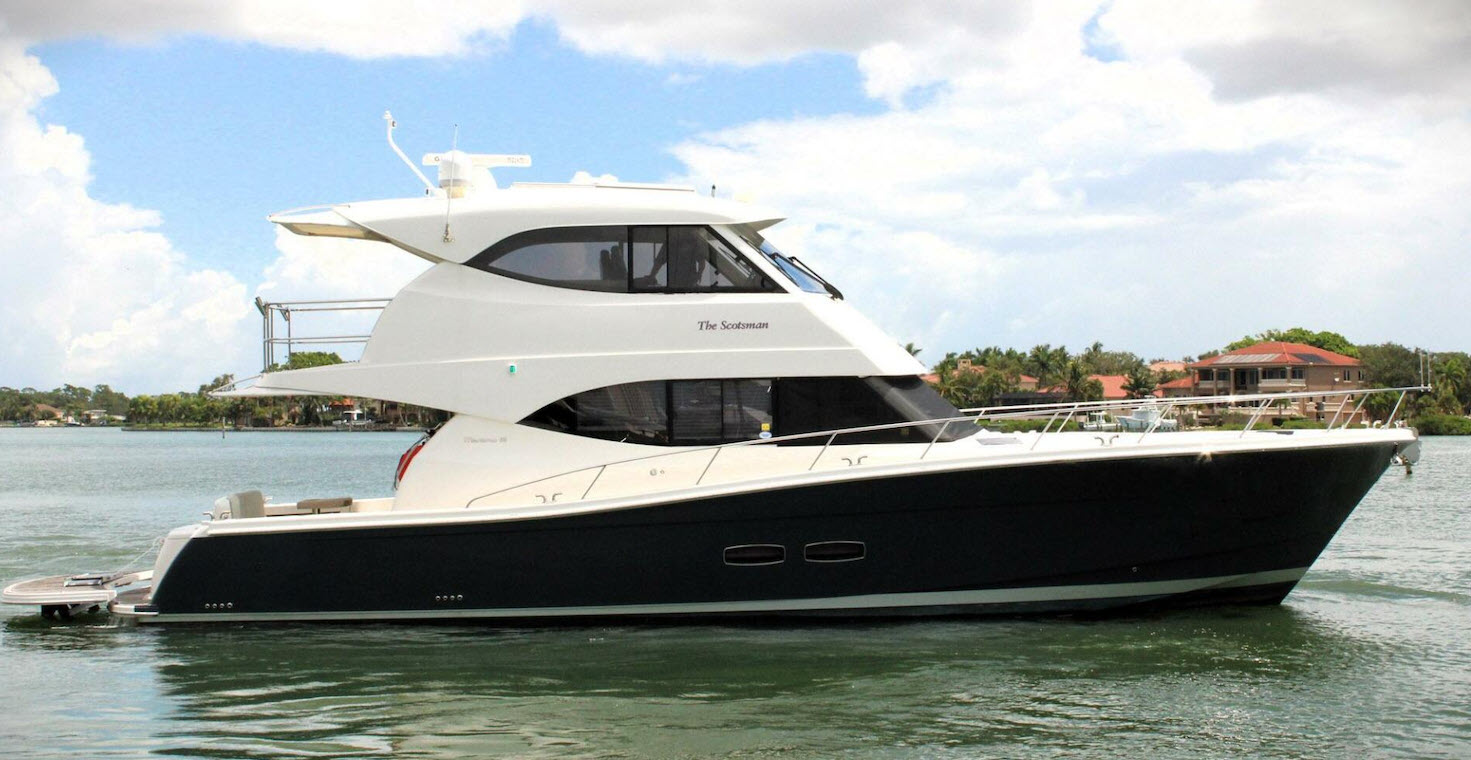

How Much Do Yacht Brokers Make? (Helpful Examples)
Yacht brokers can be a great help when you are looking to buy or sell a yacht.
It’s always nice to know exactly how much they typically make from the sale. This way you can (often) negotiate a better deal and make sure you are not being ripped off!
How Much Do Yacht Brokers Make? The base salary for a yacht broker is typically between $15,000-$30,000. On top of that, a yacht broker typically earns around 10% commission on the sale value depending on the size of the vessel.
Here are the salary and commissions yacht brokers typically make from a sale.
Table of Contents

How Much Do Yacht Brokers Make in Salary?
Depending on who they work for, a yacht broker might make a base salary and commissions on top of that.
If a company is paying a base salary, they are not likely to pay as high of a commission as you would get in a commission only position.
Yacht broker base salaries could range from around $15,000 to around $30,000.
This is not a large amount of money, which is why yacht brokers rely heavily on commission to make their money.
Oftentimes, yacht brokers do not get a base salary and will work solely on commission.
How Much Do Yacht Brokers Make in Commissions?
Because yacht brokers work mainly on commission, you will want to ensure that you have sales skills before you try to make a living as a yacht broker.
Like the real estate industry, yacht brokers usually get the commission paid to them by the seller involved in the transaction.
There are two ways that commission can be calculated, either using a net number or a percentage.
Net Commission Levels:
A net number is when the commission is a set number negotiated with a seller. This means that no matter the price received for the boat, the yacht broker will get paid the amount agreed upon.
There are some pros and cons to this method.
If you have a set commission then you know what you are making up front. This can be ideal if you like having security in your commission.
This also means that if the boat sells for less than you anticipated, your commission will still be what was originally agreed upon instead of decreasing with a low sale.
This also means that unfortunately if you sell the boat for higher than anticipated, your commission will not be increased to reflect the sale amount.
If you are the seller, the pros and cons of using a net commission are reversed. If you sell the boat for a lower amount, you will have to pay more in commission than you might have with a percentage, but if you sell the boat for more than anticipated you will profit more from the sale with a lower commission.
An example of a net yacht commission might be:
- If the yacht does sell for $500,000.00 you would make 10% on the sale.
- If the yacht sells for less, such as $450,000.00 you would make 11% commission.
- If the yacht sells for more, such as $550,000.00 you will only make 9% commission.
Percentage Commission Levels:
A percentage commission is where you get a certain percentage of the sales price of the yacht. This means that your commission will change based on how much you are able to get for the boat.
The downside to this is that your commission is based entirely on how well you do with the sale. If you do not sell the boat for as much as you anticipated, you will make less money.
However, if you end up selling the boat for more than anticipated you will make more.
The majority of yacht transactions use a percentage commission structure. The percentage is often agreed upon between the seller and the broker in advance.
The most common commission for a yacht broker is 10% of the sales price. This is not a number that is set in stone.
An example of a standard commission sale would be:
If you have a yacht that you would like to sell for $500,000 and you have agreed upon a 10% commission your profits could vary:
- If the yacht does sell for $500,000.00 you would make $50,000.00 on the sale.
- If the yacht sells for less, such as $450,000.00 you will only make $45,000.00 from the commission.
- If the yacht sells for more, such as $550,000.00 you would make $55,000.00 from the commission.
Some brokers may offer a lower commission option to bring in sales and stay competitive. These could be between 3%-5%.
One downfall to a lower commission is that it discourages brokers who might have potential buyers. This is because usually, the buying and selling broker split the commission. If a buying broker can show their clients a yacht that would get them a higher commission, they are more likely to do so.
Commission Splitting Levels:
Commissions are typically paid by the seller of the yacht. If the transaction involves two brokers, they often split the commission 50/50.
An example of a split commission could be:
If you have a yacht that you would like to sell for $500,000 and you have agreed upon a 10% commission and there are two brokers the transaction would vary.
- If the yacht does sell for $500,000.00 you and the other broker would make $25,000.00 on the sale.
- If the yacht sells for less, such as $450,000.00 you and the other broker would each make $22,500.00 from the commission.
- If the yacht sells for more, such as $550,000.00 you and the other broker would make $27,500.00 from the commission.
This means that the buyer does not pay commission to their agent and that it comes out of the commission paid to the selling agent.
If a deal is negotiated beforehand it is possible that the commission is split differently. Local brokers that work together often might have a deal set that splits commission 70/30 with 70% going to the selling broker.
You may also have to split commission if you work for a brokerage company or dealership. Brokerage companies or dealerships will likely only give you a percentage of the commission earned.
This amount can range from 30% to 70% of the collected brokerage amount. This number could be affected by base salary and other factors depending on what company you work for.
An example of a commission when working for a brokerage company or dealership might be:
If you have a yacht that you would like to sell for $500,000 and your contract states that you get 70% of the commission per yacht that you sell.
- If the yacht does sell for $500,000.00 the commission would be $50,000.00. You would get $35,000.00 and your company would get $15,000.00.
- If the yacht sells for less, such as $450,000.00 the commission would only be $45,000.00. You would get $31,500.00 and your company would get $13,500.00.
- If the yacht sells for more, such as $550,000.00 the commission would total $55,000.00. You would get $38,500.00 and your company would get $16,500.00.
Even though you make less commission, working for a company is a great way to start your client base. Most people would rather go to a trusted company or dealership than someone working out on their own.
How Do I Become a Yacht Broker?
If this job seems ideal for you, there are some steps that you need to take before you can become a yacht broker.
One way to become more attractive as a yacht broker is to get a degree in marketing or sales. This degree is not required, but a lot of companies will look at candidates who have a higher level of education and some knowledge in these fields.
You will also be more likely to get a job as a yacht broker if you have sales experience.
If you do not have sales experience you should look for entry-level positions that will put you through a training course.
If you cannot find a position in yacht sales, having experience selling other high ticket items, such as cars, will help to show future employers that you have a proven sales record.
In some states, you might be required to obtain a brokerage license. You might also be required to pass a background check before being able to obtain this license.
If you do not need a license, you might benefit from getting certified. Organizations such as Yacht Brokers Association of America can certify you after 3 years of experience. This will help raise your credibility to employers and potential customers.
Overall, with salary and commissions, as a yacht broker, you could make an average of $121,000 per year. This depends highly on location and type of yachts sold. Some yacht brokers even make closer to $300,000.00 per year.
Yacht brokers should be sales motivated and thrive in an unconditional work environment. They do not spend the majority of their time behind a desk. Being a yacht broker can be challenging and highly rewarding!
Click to share...
- Yachting for beginners
- Owning a yacht
- Motor Yachts
- Sailing Yacht
- Indian Ocean
- Mediterranean
- Buying or Selling a Yacht
- Yachting Events
- FAQ – Luxury Yacht Charter
- FAQ – Buying a Yacht
- FAQ – Sell your Yacht
- How Much Does It Cost To Charter A Luxury Yacht?
- All our Blog Post & News

Yacht Brokerage Fees: What You Should Know

Buying or selling a yacht is an expensive process. With higher value boats, a broker is almost always part of it. While you can sell a boat without a broker, unless it’s a small boat on a local cash deal, a broker increases your odds of getting a buyer and a better price.
But what does this cost you? And what are you getting for your money?
What does a yacht broker do, exactly?

Working on a percentage of selling price means that larger yachts have larger fees. While there is room for negotiation, most brokers are reluctant to discount commissions deeply because larger yachts take considerably more time and effort to sell. Brokers will incur more expenses, and it may take quite a while to realize those expenses in a fairly refined yacht market. It’s also harder to attract co-broker interest on discounted commissions.
For lower value boats, most brokers will have a minimum fee. Smaller, older boats still take time and expenses to sell, but much lower sale prices lead to smaller percentage based fees. A minimum ensures the broker doesn’t take a loss on the sale.
Read also: Yacht vs Superyacht vs Mega Yacht: which differences?
Special sales, marketing, and business considerations
The brokerage typically pays selling and marketing expenses, and they recoup those expenses from the brokerage fee. However, certain exceptional third party expenses may be charged to you at closing costs, for example, bank fees, documentation services, and any exceptional legal services from deal complications, such as undisclosed liens.
The listing broker should have a marketing plan, and will spend money to put together a professional sales package and listing. It’s not common, but if an owner makes requests for additional media shoots or special advertising and marketing beyond what the broker normally provides, there may be charges.
Exclusive vs. Open Listings
An exclusive listing gives one broker the right to sell your boat, but an open listing allows any broker to bring a buyer and make a commission. All brokers prefer exclusive listings, and those who take open listings may offer a different commission for an exclusive listing.
Exclusive listings usually work better for both sides, since brokers will spend money marketing and advertising an exclusive listing that they won’t for an open listing. And you may save a little on the commission and get your boat sold more quickly.
Broker Reputation
The best brokers rarely bend on their fees, because they don’t have to. With years of experience in the business, they know how to get deals done in an exclusive market, and they don’t need to induce new listings by discounting price.
Newer brokers or those with less experience or few listings may offer discounted fees to attract business. There’s nothing wrong with their services, and they may sell your yacht with no problem. But a lower commission also affects co-brokers, so other brokers may give your yacht a lower priority if it doesn’t pay as well.
When are brokerage fees paid?

While there isn’t any universal pricing structure for brokerage services, there are a few normal ranges that you can expect to pay for standard service. So look at all the closing paperwork, statements, and invoices carefully. Most brokers are honest, but like any business transaction, it pays to double check for mistakes or intentional up charges.
A sales commission fee is above 10%
Commissions of 10% are typical in buy/sell transactions and are sometimes lower. But it’s rare to see a sales commission over 10% unless it’s on a small boat with a minimum fee. If there are multiple brokers involved, they should split the commission, not add to it, unless you’re informed in advance.
A charter fee is over 20%
While charter fees typically run 15%, they may go as high as 20% if there are multiple brokers involved in a booking. Amounts over that should draw your concern.
Your bill is significantly more than the management contract specifies
The bottom line is what you have in writing. You should always have a written agreement for any brokerage service, and the fee and payment structure should be spelled out exactly. If you can’t match what you’re being charged with to what they agreed to in writing, then you have a problem.
Other sailors and yacht owners have experience with brokers and are usually happy to share the good and the bad. So ask your yachting friends and find out what they’ve been quoted and had to pay.
And don’t be shy about contacting multiple brokers for quotes on any service before you select one. An honest broker will be upfront with you about costs, and won’t try to hide anything or hesitate when pressed for specifics.
Fair fees ranges for yacht brokers

What differentiates a yacht from a superyacht or a mega yacht?

Chartering Requirements and Regulations: A Guide for Boat Owners

What are the Fastest Cruising Catamaran on the Market?
How to Become a Yacht Broker: Requirements Explained

Fun fact: U.S. boat sales can reach heights of up to $41 billion bucks each year. And while most people want to join the frenzy by saving up to buy their own boat, other clever cats join in on the big business by selling the boats. Yachts in particular can sell for a very pretty penny. So hopping in on the craze by starting a career as a yacht broker might get you a sweet slice of that $41 billion dollar business.
But although it might seem pretty lucrative to become a yacht broker, you can't really just head to the dealership and take on the role. On the contrary, there are quite a few hoops you might have to jump through to start a career in the yacht sales business. Wondering how to become a yacht broker? Here's what the job requires.
Basic Knowledge of the Business
First of all - would you buy a car from a guy who's never driven one? Exactly. Before you even think about becoming a yacht broker, you have to make sure you know what to tell your buyers. First hand experience with yachts should give you the upper hand in the business so that you know exactly how to sell a boat's good points and how to take attention away from its flaws.
Yacht brokers need to know the need-to-knows of the business. If you don't have a boat of your own, then you can visit your local marina and talk with the boat owners there. Visit a dealership and ask about boat specifics. You can even do research at home. It pays to know everything there is to know about boats if you want to really get your buyers to seal the deal especially if you don't have a lot of sales experience yet.
CPYB Certification
For the record - certification isn't required if you're wondering how to become a yacht broker. In fact, not a single brokerage requires it since they're more interested in experience in sales and skills. But it is helpful for buyers who want to make sure they’re dealing with someone with a good sales record.
That's exactly what certification is for. Presently, only the Yacht Brokers Association of America ( YBAA ) offers a course for certifying brokers, providing the title Certified Professional Yacht Broker (CPYB.) Applicants must be able to provide several documents to start the certification process. These include:
- Proof of present employment as a yacht broker for at least 1 year
- Proof of employment as a yacht broker for at least three years in the past 10 year period
- Proof of ethical yacht sales and necessary documentation
- A dedicated escrow/trust account for all client funds in trust
- Where applicable, the individual holds all necessary licenses required by the local government
- No violations for the last seven years of any surety or Codes of Ethics of any brokerage organizations or groups that the applicant is a part of
- Pass the CPYB exam
Individuals who comply with these requirements (among several others) are eligible to obtain certification as a Certified Professional Yacht Broker from the Yacht Brokers Association of America.
Alternatively E-learning courses and seminars are also helpful for developing skills. The Association offers courses on warranties, insurance, marketing, co-brokerage, and all of the nitty gritty details of being a yacht broker.
These e-seminars can be helpful in providing insight so you can navigate the work of selling boats, offering important knowledge on specifics that you might not be able to find anywhere else.
Do You Need a License for a Yacht Brokers Career?
To be clear, there are very few states that actually require a yacht broker to have a license . As of writing, only the states of Florida , California, and Virginia require yacht brokers a license to practice their trade through the local government. Other states have no yacht sales regulations.
The requirements for acquiring a license change between states, but you might expect some of these requirements to pop up during the process:
- At least 18 years of age
- A fixed place of business
- Employed as a yacht broker as your primary occupation in another state for at least three years OR
- Own and operate a business selling new or used yachts in the state for at least three years immediately after applying for a license OR
- Employed as a licensed yacht broker for at least a year out of the last five years in the state
- Relevant certification from the YBAA and licenses
These are a must for licenses in California, but Florida and Virginia might require completely different documents and regulations. Licensing process fees can cost you between $200 and $300 to become a licensed broker, depending on the place you're in. It may be helpful to check locally to get a better idea.
Renewal of licensing may have to take place annually depending on local regulations, but it can be different for different states. In some cases, you might also have to complete and pass a written exam to ensure that you're knowledgeable on the specifics of the industry before you can become a licensed broker.
Education, Degree, and School Requirements for the Career
Is a degree a must to become a yacht broker? Yacht brokerages will usually prefer employing yacht brokers with at least a Bachelor's Degree, but it's not uncommon for high school graduates to get jobs as yacht brokers. Of course, a college education and a Bachelor's Degree in business, marketing, sales, or any other related course can be helpful, but you will find it's not always a must in most states.
Selling yachts and sealing deals aren't really skills they teach you at high school -- you get that from years of sales experience. If you've got the chops to make sales and you know the ins and outs of yachts, then it shouldn't be impossible to get a job as a yacht broker -- even without a college degree or an extensive background in school based education especially if you pass the brokerage's exam and requirements.
How Much Do Yacht Brokers Make?
What's a yacht broker salary like? Yacht brokers work on a commission just like any other broker or salesperson career, which means that they make more when they sell more. According to statistics, a successful yacht broker can make a salary of as much as $120,00 a year if they're dealing with higher end yacht models. But that's a very generous estimate of what real figures actually look like.
If we're being realistic, a yacht broker can make an average of about $70,000 a year. That places their weekly salary payout at around $1,300 to $1,400. Of course, peak seasons do exist where sales increase, earning them an extra $500 to $1,000 a week if they're lucky.
Another helpful piece of information is that the amount they get in terms of commissions isn't permanent. Most brokers will ask for 10% of the total sales, but there are net commissions and percentage commissions.
With a net commission agreement, the broker gets the exact amount agreed with the clients regardless of whether or not the yacht is sold for a lower or higher price after negotiations. On the other hand, percentage commissions will earn the broker a specific percentage of the successful sales, which is affected by negotiations made on the sale.
You'll also have to consider the situation if there's a broker working for the buying end as well. The listing broker and selling broker will often have to split the commission from the sales. So if the clients agree to pay a 10% commission on the sale, the brokers won't get 10% each, but will instead get 5% each for a total cut of 10%.
Tips on How to Become a Yacht Broker
- First of all - connections are key in this career. Expand your network by visiting boat shows, dealerships, and other places where you can meet new people in the industry.
- It's helpful to ask a pro. Find and train at a yacht brokerage under licensed or experienced yacht brokers with lots of sales experience to get a better idea of the intricacies of the sale and relevant skills and knowledge.
- You must learn to accept rejection. Yachts are expensive, and even the most interested buyers can back off of a deal when their budget won't allow it.
- Maintain previous contacts. Prospective buyers who didn't push through in the past might be more comfortable to purchase a boat later in the future. It may be helpful to keep in touch.
- Be likable. You and your competition are all selling the same boats. It's your personality that will make all of the difference.
- Go online. A lot of your prospective buyers exist on the internet. If you want to reach a wider audience, try your hand at online marketing.
- Be teachable. If you don't have a lot of experience or a degree in marketing or business, make up for the school deficit by attending seminars and learning courses to expand your knowledge and skills.
FAQs About How to Become a Yacht Broker
Is it hard to become a yacht broker.
All jobs come with their own unique set of challenges. Becoming a successful yacht broker requires persistence and lots of exposure to the actual job. You will find that there are intricacies you'll only learn once you're out on the field since they're not taught in school or in textbooks. Work with a more experienced broker to learn more about what it takes to secure those sales.
What about luxury yacht brokers?
Selling luxury superyachts and gigayachts can earn you massive income in a single transaction, but it's not quite as easy as selling small fry. You're going to need lots of sales experience since you're going to deal with a yacht brokerage and corporations instead of not private individuals.
They might also be more particular about making sure their brokers education, preferring those that have a Bachelor's Degree in business, marketing, and other appropriate courses and not just a high school diploma. It's always best to start out with smaller boats and then work your way up by joining a brokerage firm for luxury yachts for the super rich clientele.
Quitting Your Day Job?
If you're thinking about quitting your day job to pursue your passion for boats, then it pays to know how to become a yacht broker. You'll find that it will take some serious sacrifice and learning before you can call yourself a success in the industry. But with the right contacts, proper licenses and experience, and lots of practice and exposure, you might just be able to secure for yourself a high paying job that puts you in the company of some of the richest communities around.
Related Posts

Do Yachts Have Air Conditioning? (Yacht AC Types)

How Long Does It Take to Learn to Sail a Yacht? (How to sail)

Do Yachts Have Lifeboats? [The Complete Answer]

Captain Sandy Age: How Old is Captain Sandy Yawn?


Service Locator
- Angler Endorsement
- Boat Towing Coverage
- Mechanical Breakdown
- Insurance Requirements in Mexico
- Agreed Hull Value
- Actual Cash Value
- Liability Only
- Insurance Payment Options
- Claims Information
- Towing Service Agreement
- Membership Plans
- Boat Show Tickets
- BoatUS Boats For Sale
- Membership Payment Options
- Consumer Affairs
- Boat Documentation Requirements
- Installation Instructions
- Shipping & Handling Information
- Contact Boat Lettering
- End User Agreement
- Frequently Asked Questions
- Vessel Documentation
- BoatUS Foundation
- Government Affairs
- Powercruisers
- Buying & Selling Advice
- Maintenance
- Tow Vehicles
- Make & Create
- Makeovers & Refitting
- Accessories
- Electronics
- Skills, Tips, Tools
- Spring Preparation
- Winterization
- Boaters’ Rights
- Environment & Clean Water
- Boat Safety
- Navigational Hazards
- Personal Safety
- Batteries & Onboard Power
- Motors, Engines, Propulsion
- Best Day on the Water
- Books & Movies
- Communication & Etiquette
- Contests & Sweepstakes
- Colleges & Tech Schools
- Food, Drink, Entertainment
- New To Boating
- Travel & Destinations
- Watersports
- Anchors & Anchoring
- Boat Handling
What A Yacht Broker Can Do For You
Advertisement
Especially when buying or selling a large boat, the right broker can reduce stress and make the transaction go smoothly and painlessly.

A broker can take the complications out of buying or selling your next boat. (Photo: Michael Vatalaro)
When BoatUS member David Issacson bought his first boat 26 years ago, he searched the newspaper classifieds in the morning (remember those?), located a couple of candidates before noon, and by 3 p.m. wrote the seller a check for $1,000 for a 17-foot boat he took fishing that day. "It was so simple then," he says. "Pretty much like buying a cheap used car. I don't even think I got a bill of sale. It was all done with a handshake." Now that he's retiring, he's looking for his fourth boat, which he says will be much bigger, probably in the 42- to 45-foot range. "I have no idea what it's going to take now. I've never had a boat that was documented or had a loan on it. I don't even think they have classifieds in the paper anymore, and I'm not sure what the process is these days."
Issacson is exactly the type of person who could benefit from using a boat broker. Boat brokers are similar to real-estate agents, but with important differences: They're far less regulated, and their commission is 10 percent rather than six percent. Unlike realtors who must take classes, sit for an exam, and be licensed in every state, only boat brokers in Florida and California have to be licensed and only California requires an exam. In most other states, anyone can call themselves a boat broker. And while all brokers have certain legal responsibilities to their clients, selecting one should be done carefully. Ask around at your marina or boatyard and get referrals from others who have used a broker before. Talk to two or three and get a feel for them, just as you would with a real estate agent. One way to increase your chances of finding the right broker is to look for a Certified Professional Yacht Broker (CPYB). These brokers are members of the Yacht Brokers Association of America (YBAA), have taken a comprehensive exam, have pledged to abide by a code of ethics, and will work with the BoatUS Dispute Mediation Program (see links in sidebar).
If You're Selling
There are several advantages to using a broker, the biggest of which is exposure. Plastering "For Sale" signs in yacht clubs and marinas can't equal the power of a broker's listing, especially with larger boats that have a smaller pool of buyers who may not even be in the same state. Brokers typically list boats through websites such as Yachtworld, which is easily searchable by anyone, anywhere in the world. Only brokers can list boats on the site, which functions much like the Multiple Listing Service for real estate agents.
Here's How A Broker Can Help
If you're the seller, a broker will:.
- Advertise your boat. Brokers should list your boat on Yachtworld and advertise in other places where appropriate. Find out what their marketing plan is and get it in writing.
- Price your boat realistically. Brokers have access to recent sale prices and know a good starting point.
- Prescreen responses to advertising. This will avoid most tire kickers.
- Show your boat to prospective buyers. This will save you from wasting time with buyers who don't show up.
- Communicate all offers from potential buyers to you.
- Negotiate the selling price. This is where brokers can really earn their money.
- Draw up sales agreements and accept deposits. Many brokers can do this electronically over computers, tablets, and even smartphones.
- Arrange for sea trials and schedule surveys.
- Coordinate closing.
- Transfer funds to you. Now you can start shopping for your next boat.
Correctly pricing a boat is critical to getting it sold, and an experienced broker has a very good idea of what a boat will sell for and can price it accordingly. Brokers typically have access to what similar boats have sold for in the local area and they'll prepare a listing based on the kind of boat and type of buyers expected. They'll take photos, write an enticing description, and recommend things to improve the look and marketability of your boat. Brokers can also help you navigate some of the more confusing aspects of selling such as corporate ownership, loan payoffs, bills of sale, and other documents needed for transferring ownership. Aside from listing and advertising the boat, their most important job is helping move the process along once a buyer is found. Brokers can also help a buyer obtain financing and assist with changing the USCG documentation. While the 10-percent commission is usually not negotiable, brokers will sometimes discount it for a sale that might be falling apart because of a survey report or other defects found on a boat. The different listing contracts used by brokers can be confusing, but they're not complicated once you understand the two main types, a central agency agreement and an open listing agreement.
A central agency agreement (sometimes called an exclusive listing) means you've hired a specific broker to sell your boat. With this type of agreement, the broker typically lists your boat on Yachtworld and — this is important — is obligated to sell it through a co-brokerage arrangement. Co-brokerage means that if another broker finds a buyer for your boat, your broker agrees to split the commission with him. This incentive to help each other is why about 70 percent of all brokerage sales are co-brokered. Keep in mind, though, with this type of agreement, even if you bring in the seller or end up donating your boat, you'll still be liable for the broker's commission. The majority of brokerage sales are central agency agreements.
An open listing agreement means you've given more than one broker the right to sell your boat and you also retain the right to sell it on your own. The disadvantage is that because no broker is guaranteed at least a part of the commission, it's not very likely any of them will spend the money to list your boat on Yachtworld or pay for other advertising. There can also be confused communications between multiple brokers and potential buyers. On the other hand, a hungry broker may be more motivated to bring you a buyer because he would get the entire commission. With this type of agreement, if you find your own buyer, you don't owe anyone a commission. For either type, don't be pressured into signing for a longer term than you're comfortable with. Six months is typical, but don't be afraid to ask for less, though a broker typically needs at least a couple of months to generate interest. Usually, you can walk away from any contract after giving 30 days notice. Most agreements automatically renew, so give notice before that if you want to cancel. No matter what kind of listing, ask for biweekly progress reports.
Selling It Yourself
For Sale By Ow ner (FSBO) certainly sounds attractive. Not only do you pocket 10 percent more than if you used a broker, but you're in charge of the whole process. Selling it yourself has drawbacks, however. You won't be able to get the same kind of national exposure a broker can, and you'll be responsible for keeping the boat in top condition and available for showing. And, because most boat shopping occurs on weekends, expect to be tied down during your time off. Finally, like many others, you may simply dislike negotiating. But if you want to save some serious money, BoatUS can help. Our thousands of online classified listings are viewable by anyone, anywhere in the world, and we offer an escrow service that takes the anxiety out of the financial part of the transaction. We also offer members full documentation service, boat financing, comprehensive insurance, and on-water and roadside towing coverage.
If You're Buying
While owners may find the process of selling to be an anxious one, buyers are looking for their next dream boat and are likely to be enjoying looking around, trying to find the perfect fit. But buyers tend to get apprehensive once it comes to plunking down hard cash. This is where a broker can make the process less stressful. Brokers should have a separate bank account for holding deposits and there should be wording in the contract specifying what the sale is contingent upon as well as how and when the money will be returned if the sale falls through.
It's important to remember that the broker in a typical sale is getting paid by and working only for the seller, not the buyer. A broker will try to get the highest possible price (that's what his commission is paid from) and will try to sell his client's boat even if it's not necessarily the best deal for you. You're on your own with negotiations and paperwork advice. You can, however, enter into an agreement with a broker through a buyer's broker arrangement. A buyer's broker will represent you, not the seller. Once they know what you're looking for, they can scour their sources and suggest likely boats for you to view, assist in negotiating a price, and help with the paperwork. Typically, a buyer's broker gets a commission split from the seller's broker so there's no cost to you, but read the agreement before signing.
When it's time to seriously consider a boat, it will need to be hauled out and surveyed — something that's usually paid for by the buyer, though as with anything in a sale, that's negotiable. Never use a surveyor recommended by the broker or seller; it's critical to hire an independent, qualified surveyor (see links, below) who has no stake in the outcome. Not only will the survey uncover needed repairs and deficiencies, it will also establish a fair market value, all of which can be used for negotiations. It will almost certainly be needed for financing and insurance as well.
Useful Links
- Finding a Certified Professional Yacht Broker
- Find a Marine Surveyor
- BoatUS USCG Documentation Service
- BoatUS Financing
- BoatUS Insurance
- Find out if a Florida Broker is licensed
Related Articles
The truth about ceramic coatings for boats.
Our editor investigates the marketing claims of consumer-grade ceramic coatings.
Fine-Tune Your Side Scan Fishfinder
Take your side-scanning fishfinder off auto mode, and you’ll be spotting your prey from afar in no time
DIY Boat Foam Decking
Closed-cell foam flooring helps make boating more comfortable. Here’s how to install it on your vessel
Click to explore related articles
Charles Fort
Contributing Editor, BoatUS Magazine
Charles Fort is BoatUS Magazine's West Coast Editor. He often writes local news items for BoatUS Magazine's Waypoints column and contributes to Reports, in-depth tech features in every issue written to help readers avoid accidental damage to their boats. He is a member of the National Association of Marine Surveyors, he's on ABYC tech committees, and has a 100-ton U.S. Coast Guard license. He lives in California.
BoatUS Magazine Is A Benefit Of BoatUS Membership
Membership Benefits Include:
Subscription to the print version of BoatUS Magazine
4% back on purchases from West Marine stores or online at WestMarine.com
Discounts on fuel, transient slips, repairs and more at over 1,200 businesses
Deals on cruises, charters, car rentals, hotel stays and more…
All for only $25/year!
We use cookies to enhance your visit to our website and to improve your experience. By continuing to use our website, you’re agreeing to our cookie policy.

Brokerage Services and Fees: What You Need to Know When Choosing and Buying a Yacht
Buying a yacht is a significant investment that requires time and expertise. If you lack the knowledge and time, you may need a yacht broker to help you through the process. However, many people confuse the role of a yacht broker with that of a real estate broker. This article explores the role of a yacht broker and the fees associated with buying a yacht.
The Role of a Yacht Broker
Yacht brokers play a crucial role in yacht buying and selling transactions. They have the necessary knowledge and experience to guide clients through the process. Unlike real estate brokers, yacht brokers offer specialized services tailored to the unique needs of their clients. They help with yacht search, brand recommendation, market pricing analysis, condition checks, advertising, and transaction support.
Brokerage Fees
The commission paid to a yacht broker is typically around 10% of the transaction value. However, for yachts costing more than $10 million, the commission is not more than 10%. The commission is usually shared between the buyer’s representative and the seller’s representative on a 60/40 or 50/50 basis. The commission is specified in the agreement between the boat owner and the broker and is paid after the transaction is complete. This motivates the broker to invest in the sale, knowing that their reward depends on it.
Payment and Transaction Process
The payment process for buying a yacht involves two payments. The first payment, usually 10% of the vessel’s cost, is made at the time of purchase. The second payment, which is 90% of the vessel’s cost, is made when all the transaction documents are ready, and the boat is complete. The boat is then removed from the register (if it is a secondary market), and a Bill of Sale is issued. The Bill of Sale is the main document indicating ownership of the yacht, and it is used to register the yacht in the owner’s country or a charter company.
MOA Yacht Purchase Agreement
The MOA contract is the primary contract used in yacht purchases. This contract fully protects the buyer’s rights. It cannot be found or downloaded from the internet, but a broker can provide it upon request. It is essential to read the contract’s terms since it may contain clauses requiring payment of a commission, even if the yacht is not sold.
Brokerage Fees and Negotiation
Large brokerage firms have fixed rates, and negotiation is not usually possible. Small brokers may be more open to negotiation, but this rarely happens since the brokerage community frowns upon it. A drop in one broker’s percentage can lead to a general drop in the market percentage, which is not desirable. Regular clients may receive preferential terms, but becoming a regular client requires owning several yachts.
Choosing and buying a yacht can be an overwhelming task. Working with a yacht broker can simplify the process and ensure a smooth transaction. The brokerage fees are usually around 10% of the yacht’s cost, and they cover a wide range of services, including advertising, condition checks, and transaction support. Before signing any contracts, it is crucial to read and understand the terms, including any clauses requiring payment of a commission, regardless of whether the yacht is sold or not.
Related Posts
Tips for buying a yacht or boat: what to look for before you buy, setting sail: tips for future ship owners, yacht financing: overview of financing schemes in europe.
Type above and press Enter to search. Press Esc to cancel.

A Buyer's Broker, How it works!
What are the advantages of using a buyer’s Broker, and how does it work? How much money buys how much boat? What starts to go wrong at what age? How can I tell a good deck from a bad deck? What’s the difference between a production boat and a pedigreed boat? With a buyer’s broker it’s all about educating our customer. All good questions and we have those answers and so much more. As a Buyers Broker we represent you and you only. Think of us as your coach to help you come out on top!
In a brokered boat sale (with another broker) the commission is paid by the seller. It costs no more to buy the boat yourself or use a buyer’s broker. Not one cent more! It probably will cost less as we know what a boat is worth, and more experienced with the boat buying negotiation process. We are constantly surprised how uninformed buyers pay too much for a boat. A broker has access to comp databases not available to the public. We can tell within a percent or two what an individual boat SHOULD sell for, and then it is our job to get it for less. We do it all the time. If you get an inappropriate boat it will become apparent pretty quickly and then what do you do? Either live with it or go through a costly process of selling it and getting something better suited.
An educated customer is key, and that is how we will spend our time with you. With every boat we look at together you will learn so much. We will point out what appear to be subtle things to you and are glaring signs to us. We know boat construction, differences between manufacturers, how boats age, and what is a good deal and what to run from. Do not let emotions have you buy an inappropriate boat. We will keep it logical and cerebral. And then when we narrow it down to what makes sense, your emotions will tell you which one!
A Buyers Broker can recommend a GOOD surveyor . There are definitely some out there that are not conscientious, and a few are seriously bad news. Most are excellent, but if you pick a bad one it could cost you dearly. Again we represent you and you only.
So you have nothing to lose and everything to gain. At The Cruising Yacht Brokerage, we have decades of experience in the marine industry and a sterling track record of finding the appropriate boat for a customer. It often is a very different boat than what the buyer thought he wanted when he started, but through the educational process we use, they learn so much and often angle off in a different direction.
Give us a call or shoot us an email. We will sit down and talk before we look at anything. What are your goals? What size did you have in mind and WHY? What is your perfect day on the water; messing around with the family or getting the most speed you can get? Lots of questions and the answers will start to bring clarity to what we should start looking at.
Please keep in mind, we can only help you if the boat is listed by a broker and be available for co-brokerage and we must make the initial contact with them (same as real estate).
We are very good at this. Let’s talk!
Recent Boats Sold
As buyer’s broker, get in touch with us, check out our current listings.
Please contact us at (401) 405-1979 or [email protected] for any additional information

© 2024 The Cruising Yacht Brokerage, LLC. - All rights Reserved | Web Design by Black Door Creative
- Our Listings
- Buyer’s Broker
Frequently asked questions Yacht Brokerage
Advertising strategies for yachts, how to determine the asking price, why exclusively use a brokerage house to list a yacht for sale, sea trial and survey - how they work, what is involved in the administration of selling a yacht, how to make an offer on a yacht , what does a yacht broker do, what is a broker's involvement in after-sales, how do brokers deal with enquires, what is a broker's role to a yacht buyer.
Most brokerage houses have a standard outline plan of how a yacht is to be advertised in the most appropriate media. A broker�s objective is to devise a strategy with the best chances of reaching the most qualified audience for each yacht category. Common methods are e-marketing, online listing access for public viewing, yacht shows, print media, using in-house databases of clients, brokers and representatives all combined with professional "knowhow".
To ensure an appropriate sale, it is essential to ask a fair price. A broker can help establish fair-market value for the yacht through access to actual sold yacht data that is not available to the public.
Yacht broker�s work hard to generate interest and enquires for their yacht listings. They also protect and promote the principles of their clients. Most brokers sign a "Central Agency Agreement" with the owner/seller, providing a secure arrangement between all parties. Brokers will also work co-operatively with most other brokers on a co-brokerage basis. Yacht brokers charge a commission when the yacht is sold, and the commission amount would have been set in writing in the Central Agency Agreement. If another broker brings a buyer to the table on a co-brokerage arrangement, the total commission will normally be shared between the brokers.
A buyer of a pre-owned yacht will usually request a sea trial and the services of a marine surveyor. Buyers pay for the surveys and for hauling the yacht out of the water for inspection. The Broker will usually attend the sea trial and marine survey with their buyer to help determine how to properly address any yacht survey issues and put the problems in context. Part of this includes; estimating time and cost of rectifying and where to obtain accurate quotes for items that are unfamiliar. The Insurance Company will usually require a copy of the survey.
Brokers are familiar with all the paperwork requirements from the initial Offer to Purchase and Bill of Sale to licensing and registration; to paying tax, certificates of ownership, security agreements, and other documents needed to complete a sale. They also understand maritime and admiralty laws for the type of yachts they represent, as well as agency contracts, listing agreements, closing statements, deposit requirements and escrowed accounts to safeguard funds.
Brokers will help their buyer decide on a realistic figure to offer which will increase the chances of buying a yacht for a fair and reasonable price, and together with the necessary elements to protect interests. Once this is done, the broker will prepare a "Letter of Intent or Letter of Offer" ready for the buyer to sign. This document will display the terms of the sale including obligations that you and the seller have agreed to, and when these obligations will be fulfilled. The buyer should then make a good-faith deposit on the yacht, usually placed in escrow, and subject to sea trial and survey.
Most yacht brokers work in a similar way to estate agents. They are representatives consulted to find and purchase yachts, as well as appointed to list, represent, and sell yachts. Traditionally, the seller pays the commissions that a yacht broker earns, yet brokers have a duty to both buyer and seller in every transaction.
Once a yacht is purchased the broker will guide their client through the next stages such as; finding a berth, yacht maintenance, repair specialists, yacht handling, seamanship, sourcing yacht crew, charter management and all other after-sale fundamentals to complete the service package.
A professional broker will listen closely to your requirements and will help you determine if the yacht you are considering is the right yacht, at the best value. Brokers can objectively tell you about the condition of the yacht before you decide whether or not to spend your time inspecting it. They will source and compare similar yachts on (and off) the market, the history of the yacht, how long it has been on the market, and the motivation of the seller. Anyone can look up asking prices on yachts, but it takes a professional broker to have an intimate knowledge of current market conditions, a familiarity of similar yachts, and information on recent sale prices and time on the market through industry resources not available to the public.
Pre-owned yachts are either a "central agency listing" of a yacht broker, or a trade-in from a new yacht dealer. If you are interested in a broker's listing or a trade-in, the listing broker or dealer is likely to know the yacht inside and out. They have been selected by the owner/seller to exclusively represent this yacht and all enquiries must go through this yacht broker or yacht dealer. If you are not already working with a yacht broker, and if you find a yacht on the market of interest, you should contact the listing broker directly. However a more rewarding option might be to select a yacht broker of your own, and consult with that broker about all of your yachts of interest, and let that broker represent you in your enquiries and transactions.
- Pontoon Boats
- Privacy Policy

How Much Do Yacht Brokers Make?

Boatgroot is reader-supported. When you buy through links on our site, we may earn an affiliate commission.
If you want to make a career in the boat market, a yacht broker might be a lucrative choice. These brokers have a wide range of responsibilities, including posting classifieds, finding potential buyers or sellers, arranging meetings with clients, negotiating prices, handling paperwork, and more.
One question always fascinates boat enthusiasts – How much can a yacht broker make in a year? Since these luxury toys usually cost a fortune, one naturally thinks that brokers’ income must also be significantly higher.
However, the answer is not that straightforward. The overall income depends on a variety of factors, including the type of yacht, market situation, and, most importantly, their ability to strike a good deal.
Over the past decade, the role of a yacht broker has gained considerable recognition, with numerous individuals considering it a fruitful career option. But is it? This article revolves around the yacht brokers’ duties and salaries. I will walk you through every aspect of becoming a successful broker and making good deals. Without further ado, let’s get right in.
Yacht Brokers: Roles and Responsibilities
A yacht broker is a marketing professional who helps clients buy or sell yachts. Purchasing a boat, especially a used one, can be challenging, and buyers often need guidance. The brokers act as mediators between the two parties, helping to find the right person to do business with.
The brokers may be associated with a brokerage firm or work independently. They usually have a good knowledge of the yachts and the boat market. They also have several connections that help with legal processes and paperwork. But their communication and negotiation skills set them apart from ordinary brokers. Yacht buyers usually belong to a specific class of people, and it might take skill to convince them.
Here are some essential duties of a yacht broker:
- Locating potential buyers or sellers for yachts in the area
- Conducting market research to find the current value of the vessel and inform the clients
- Posting classifieds regarding the boat’s availability, price, ownership, etc
- Price negotiation
- Explaining sales terms to buyers and sellers
- perform in-person surveys and inspections of available yachts
- Arrange meetings between buyers and sellers and convince them to make a deal
- Getting legal formalities done, including transfer of ownership, getting a bill of sales, legal permissions, and more.
- Educate new clients regarding yacht ownership, management, legal approvals, and safety regulations.
- Following the market trends for the latest changes in rules and regulations.
- Create a network of frequent buyers, sellers, yacht designers, and other brokers.
How Much Do Yacht Brokers Earn?
The income of yacht brokers is flexible and largely depends on the number of deals they make in a month or year. However, the United States Bureau of Labor Statistics reported that the average annual salary for brokers and sales executives was $51,220 in 2020. It’s important to note that this was during the pandemic and multiple shutdowns, meaning one can expect significantly higher income these days.
Yacht brokers primarily earn their income through commissions on each deal they close. The commission amount can vary based on multiple factors, including the yacht’s size and the dealer’s location. Typically, the larger the vessel is, the higher the commission percentage is likely to be.
Moreover, the location of the sale can also have a significant impact on the broker’s income. For instance, brokers selling yachts in premium markets like Monaco or the Caribbean will likely profit considerably from their deals.
Here are some key factors that determine the yacht brokers’ income:

Market Situation
The first thing that impacts the broker’s income is the market conditions. When the yacht market is flourishing, brokers have a higher chance to strike a deal and earn a commission. The location of the buyer/seller may also boost your income. In some markets where the demand is higher, the prices of yachts can be extremely high, allowing you to earn a hefty commission on each deal.
Knowledge of the Field
Additionally, experienced brokers better understand the yacht market, which helps them make more informed decisions and negotiate better deals. The source of knowledge can be a degree in the marine field, a boat-ed exam, or simple research. Brokers who know the product they are dealing with are always in a position to explain it better to the clients and convince them to make a decision.
Marketing Experience
Experience is valuable in any sales and marketing job. As you spend time in the market, you get to learn about significant players, marketing trends, pricing history, and more. Depending on this knowledge, brokers make better decisions and choose better deals to invest their time and energy.
Also, over time, they can establish connections and build a strong network of clients, and other brokers, allowing them to make more deals and earn more commissions.
Type of Yacht
Another factor determining yacht brokers’ earnings is the type of yacht they deal with. Yacht brokers can deal with different kinds of crafts, such as sailboats, motor yachts, and mega yachts. The larger the yacht’s cost, the higher the commission a broker can earn.
What’s the Maximum Commission A Yacht Broker Can Get?
Typically, brokers earn a minimum of 10% commission per deal. So, if you assist a client in selling a $10 million yacht, you can expect a commission of $1 million.
As of 2022, the average annual income for yacht brokers ranges between $120,000 and $150,000, including their commission and payment from catering services, financial management, and other amenities.
Watch this video to learn more about yacht brokers’ income:
Other Sources of Income
Yacht brokers can generate revenue from various sources beyond just commissions, such as leasing or renting yachts. Renting a boat is popular among folks these days. It provides them with a cost-effective way of indulging in luxury.
Clients can rent a yacht without worrying about the expenses of owning and maintaining a vessel. Some brokers have established connections with yacht rental services and can assist individuals in renting a boat for a commission.
Another avenue for brokers to earn money is by assisting clients with financial arrangements. Buyers often require support from financial services, and brokers can act as their representatives to handle all the necessary paperwork and legwork. This may result in a substantial income for the broker in addition to the commission.
Yacht management services also serve as a good source of income for brokers. While some individuals prefer to hire a yacht without an additional crew for short trips, some high-rollers opt for a luxurious yacht experience with an entire crew, catering, and other activities.
A broker can provide comprehensive management support, including a staff, captain, chefs, and sporting activities like jet skiing, scuba diving, and other water sports.
The Final Word: Want to Become a Yacht Broker?
Becoming a yacht broker could be a perfect career path for marketing enthusiasts passionate about boats. This is what you need to become a yacht broker:
- A high-school diploma from a recognized educational institute
- State-issue brokerage license
- Excellent communication skills (including more than one language)
- Extraordinary negotiation skills
- Understanding of the boat market
Here is a video explain the process further:
Many yacht brokers also have a college degree in business and marketing, which can help them gain a competitive edge in the industry. A marine science or naval architecture degree can also be helpful if you want to stay in this field for the long haul. Also, prior experience in marketing, customer service, and after-sales can be advantageous if you want to work with a brokerage firm.
Ultimately, it all depends on your marketing skills and field knowledge. As a broker, you are supposed to build close relations with buyers and sellers, and it’s your responsibility to create trust and understanding between the two. This is where your negotiation and communication skills will be tested.
LEAVE A REPLY Cancel reply
Save my name, email, and website in this browser for the next time I comment.

How Much Does Carefree Boat Club Cost?

What Is One Part of a Regular Vessel and Engine Maintenance...

Best 5 Jon Boat Seats – Swivel, Leaning, Deck Seat, and...

Who Owns My Druthers Boat in Outer Banks

What Is a Commercial Lift Boat – Everything You Need To...
- Terms & Conditions
- Cookie Policy

How To Become A Yacht Broker

I consider becoming a yacht broker one of the best decisions I have ever made.
In 2016 I jumped feet first into the yacht, boat, and ship brokerage industry with little experience but with incredible passion. Selling yachts was my first job out of college and is still my only post graduation job, aside from working on this website and building other websites.
I even turned down a job offer from Google to work in the yacht industry!
One of the many benefits, in my opinion, of being a yacht broker is that the job is semi seasonal. While the definition of seasonal will change depending on where you work, not being busy for the full 12 months allows me time to offshore fish, build websites , travel, and much more.
How I Became A Yacht Broker
While in college I started a drone photography and videography business as drones, at the time, were still new to market and the barrier to entry was high.
I started by filming short video clips for car dealerships and real estate agents, but I wanted to incorporate my passions of saltwater fishing and yachts with photography.

One day I cold emailed the most reputable “fishing centric” yacht brokerage in San Diego, California and offered my drone services free of charge. Fast forwarding, this free video offer lead to monthly paid work for over a year. During this year period I was becoming more immersed in saltwater fishing and built up a small following on social media.
Upon graduating from college, I approached the owner and asked for a sales position at the brokerage, to which I was added to the team immediately. Over the last 5 years, I have been responsible for the sale of nearly $33 million in yachts and boats.
How Much Does A Yacht Broker Make?
Researching the compensation for a particular industry or position is important before making a career move.
In most cases, a yacht broker is not paid a salary, rather paid solely on commission. The standard industry commission is 10% based on the selling price of the vessel. This means compensation can range from $100,000 to over $1 million per year.
In my experience, the harder you work the more you will earn as the job is purely commission. There will be months, or several months, where you don’t bring home any income, but when the season is in full swing you will be glad you’re paid on commission and not salary.
Yacht Broker License Information
It’s fairly easy to become a yacht broker or a yacht salesperson. These terms often get lumped together as the same, however a broker owns the company where the salesperson “hangs” their license under.
Only two states in the United States required a license to sell yachts and boats. Florida requires a license for those selling vessels over 32’ that are not their own, and California requires a license for those selling vessel over 16’ that are not their own. The other 48 states are more lax, so I would suggest speaking to a local brokerage in your state about their rules.

How You Can Become A Yacht Broker
Nearly anyone can become a yacht broker or a yacht salesperson, but not everyone will succeed at the job. Below is a list of traits and actions that can help you get into the category of yacht brokers who earn a substantial living.
1. Be Driven
As mentioned earlier, this job is purely commission based so you need an excellent work ethic and a “go getter” attitude in order to generate income. Yes you can sit back and not do much work, but when starting out and building your client base, this will lead to lackluster results. Be willing to walk the docks, advertise, leverage social media, and look for opportunities to spread your name and services.
There will be some months where you don’t earn any money, just know that this will happen and be prepared. Have some money set aside to get through the slow times, but on the contrary, when the market is on fire, the sales come quick and steady.
In any business, honesty is vital for longterm success. Boats and yachts have countless systems and nuances, so when asked a question you don’t have the answer to, simply say you do not know but will find out. Follow up with your client the same day with the answer.
When it comes to negotiations, stick to your guns and don’t become intimidated. There is a time and place to offer a reduced commission or to help bridge a survey allowance gap, but don’t make this your automatic go to.
2. Have A Passion For Boats and Yachts
Your body language and attitude, whether intentful or not, will be analyzed by prospective buyers and sellers, and if you don’t show passion for what you’re talking about, then this will be apparent.

Many buyers and sellers have chosen to work with me because they could sense my drive and passion for their needs. I highly encourage you to be genuinely excited to show or preview a vessel because you can always learn something new, plus the water is your office…it doesn’t get much better than that.
Having prior sales experience will be helpful in making a seamless transition into the yacht sales industry, but I’ve found it’s not a requirement. As your deal flow increases, transactions will become easier but for the first year or two there will be a lot of learning moments throughout the sales cycle.
When starting out, take as many listing as you can to get experience learning about different boat platforms and brands, as well as work out all the kinks that can arise during negotiations, paperwork and closing.
3. Excellent Communication and Follow Up
This section separates excellent brokers from mediocre brokers. While this may be the most important aspects of the job, I think it requires the least amount of text.
- Always tell the truth and be honest…if an unpleasant conversation needs to be had, do it quickly and with a phone call opposed to sending an email
- Always stay in contact with your clients…whether they are a prospect, in contract on a boat, or a past client, maintain contact often
- Follow up early and often…be preemptive in your communication, pre addressing and questions before they become questions…a simple text message or two sentence email with an update is often all that is needed for your client to instill additional trust in you
4. Contact Local Yacht Brokerages For An Open Position
Once you have a good understanding of what you’re entering in to, it’s time to start looking for a brokerage to work under.
If you’re totally new to the industry, I recommend using Google to find reputable brokerages in your area, or you can see which brokerages advertise in the back of Yachting Magazine or Marlin Magazine for example.
For those with some experience within the boating industry, you should have somewhat of an idea of which brokerage houses are the most reputable in your area.
There is no better way to land a job than walking in and asking to speak to the owner or manager. Bring a resume and be prepared if the decision maker wants to talk right then. Even if a position isn’t available today, stay in contact via email so that when an opening does occur your name comes to mind.
Selling yachts for a living has offered me many opportunities that I could have never had without this employment. If you’re ready to work hard, then I encourage you to take the plunge immediately. The first 12 months will be difficult, but after that the learning curve begins to flatten.

Related Articles

How To Create A Profitable Niche Website In 2024

[2024] 100+ Sharing Economy Apps and Websites You Don’t Want to Miss

[2023] 100+ Ways to Make Money in Your Spare Time

How To Rank Website Content On The First Page Of Google
Leave a reply cancel reply.
Your email address will not be published. Required fields are marked *
Notify me of follow-up comments by email.
Notify me of new posts by email.

How Much Does a Boat Broker Charge? Understanding Brokerage Fees

Understanding Boat Brokerage Fees
When budgeting for the sale or purchase of a boat, it’s essential to consider the fees charged by boat brokers. These professionals facilitate transactions, providing expertise that can be invaluable, particularly in complex sales. Boat brokerage fees are predominantly commission-based, although different structures exist.
Commission-Based Fees : The industry standard commission is typically between 10-15% for new boats and 5-10% for used boats. This figure is calculated on the final sale price of the vessel. For instance, selling a used boat for $100,000 could result in a broker’s commission ranging from $5,000 to $10,000. Alternatively, the sale of a new boat at the same price might incur a commission of $10,000 to $15,000.
In certain scenarios, brokers may charge a reduced commission. Factors that can influence this include the type of the vessel, market conditions, or the broker’s assessment of the transaction complexity.
Flat Fees and Hourly Rates : Some brokers may opt for a flat fee structure instead of a traditional percentage commission, especially when services rendered do not directly correspond to the sales price. There are also cases where brokers charge by the hour , particularly for consultancy outside the scope of a straightforward sale.
It’s crucial to inquire about the fee structure early in the relationship with a broker to ensure transparency and avoid surprises. Moreover, contract terms should be examined carefully to understand any additional costs that may be part of the brokerage service.
Types of Boat Broker Services

In the realm of maritime transactions, boat brokers provide specialized services to both buyers and sellers, ranging from consultation to the handling of the entire sales process.
Buyer Representation
When a boat broker represents a buyer, they are responsible for assisting in the selection and purchase of a vessel. They typically earn a commission of around 2.5-3% of the boat’s purchase price. This service includes searching for boats, arranging viewings, and negotiating with sellers on behalf of the buyer.
Seller Representation
For sellers, a boat broker facilitates the sale by listing the boat, marketing it to potential buyers, and negotiating sale terms. The broker’s commission in this case is usually negotiated but is similarly set as a percentage of the sale price, which can vary depending on the broker agreement.
Full-Service Brokerage
Full-service brokers manage all aspects of the buying or selling process, which includes advertising, handling inquiries, conducting sea trials, and finalizing the negotiations. Some full-service boat brokers may charge more for their comprehensive services, handling everything from the initial listing to the closing of the sale.
Determining Factors for Brokerage Fees
When assessing how much a boat broker will charge, several factors come into play. These include the boat’s value, the broker’s commission rate, and various additional costs associated with the brokerage service.
Boat Value and Price
The value and asking price of the boat directly influence the broker’s fee. A higher-priced vessel often commands a larger absolute commission due to the increased effort and resources required to facilitate a sale.
Brokerage Commission Rates
Brokerage commission rates are not standard and can vary. Brokers typically take a commission ranging from 5% to 10% of the final sale price. For instance, sales of luxury yachts may incur a standard commission of about 10% . The broker’s expertise, reputation, and the services provided can affect this rate.
Additional Costs and Services
In addition to commission, brokers may charge for extra services, such as advertising, sea trials, and survey coordination. These are expenses beyond the basic commission fee , and clients should clarify these potential costs upfront.
Standard Commission Structures

When selling a boat, brokers typically operate under specific commission structures, which are instrumental in determining the cost of their services for sellers.
Percentage-Based Commissions
Boat brokers commonly charge a commission rate based on a percentage of the boat’s selling price. This percentage generally ranges from 10% to 12% . For example, selling a boat at $100,000 can result in a commission fee ranging from $10,000 to $12,000. It should be noted that for luxury yachts or higher-value vessels, the commission rate might be negotiable .
Flat Fee Commissions
In some instances, brokers may offer a flat fee commission structure. This means that the seller pays a predetermined fee regardless of the boat’s selling price. However, this structure is less common in the industry and is typically utilized for lower-cost vessels or services that are more straightforward or limited in scope.
Negotiating with Boat Brokers
When engaging a boat broker’s services , one should be aware that the broker’s fee is typically a percentage of the boat’s selling price . Fees range from a standard of 10% up to 15% for domestic boat sales. However, it is not uncommon for brokers to charge a lower commission of about 8-10% for more expensive vessels.
A buyer or seller needs to understand that broker fees are negotiable . It’s a matter of discussing terms with the broker and agreeing on a commission that reflects the service level expected. It’s best to negotiate this fee upfront before signing any contracts. In some scenarios, depending on the market climate or the unique circumstances of the boat sale, brokers may be willing to adjust their commission .
Here is a quick guide to help you during negotiations:
- Initial Contact : Establish your expectations and ask about standard rates.
- Service Level Agreement : Determine the range of services provided for the fee.
- Experience Level : Consider if the broker’s expertise justifies their rate.
- Volume Discount : If selling multiple boats, ask about a reduced commission rate.
- Closing Costs : Discuss if any additional fees might be involved in the sale process.
Remember, the broker’s fee includes market knowledge, advertising cost, negotiation expertise, and handling of paperwork, which can be highly beneficial for many boat owners. To become more informed about average rates and nuances, it is encouraged to read about how much boat brokers charge and the general working of boat brokerage . With the right approach, clients can ensure they receive fair service for a reasonable commission.
Brokers Vs. Dealerships: Fee Comparison
When purchasing a boat, individuals often consider whether to go through a boat broker or a dealership. Understanding the fee structures of each can help in making an informed decision.
Boat Brokers typically charge a commission for their service. This commission is a percentage of the boat’s selling price. On average, a broker’s commission ranges from 2.5% to 10% . A detailed examination at Boating Buddy reveals that for a $100,000 boat, a broker could charge between $2,500 to $10,000 depending on several factors including service level and negotiation.
Boat Dealerships , on the other hand, might not charge a direct commission. Instead, their revenue is often built into the price of the new or used boats they sell. A dealership may have a higher listing price for a boat compared to what one might find through a broker or a private sale, reflecting operational costs and profit margins. More information on this can be found at Boat Alert Blog .
It should be noted that buying through a broker generally offers a more personalized service which might skew towards the upper end of the commission scale. With dealerships, while the pricing can seem higher, they often include warranties and additional services that can be valuable to the buyer. A comparison at Premier Watersports provides insights into the individual benefits and includes potential added value from each option.
The Impact of Market Conditions on Broker Fees

In the boating industry, market conditions notably influence broker fees. Boat brokers manage the sale, leveraging market trends to set commissions.
Supply and Demand : When the market has a high demand for boats, brokers may see increased transactions, resulting in steadier or potentially higher fees. Conversely, a market flood with boats may drive competition, occasionally leading to lower commissions to attract sellers.
Economic Health : Economic prosperity leads to more disposable income and thus, higher boat sales and standard fees. In economic downturns, with sales slowing, brokers might adjust fees to sustain business.
Boat Type and Value : The yacht’s size and value affect commission rates. It is observed that brokers generally earn a higher percentage on lower-value boats, while sales of luxury yachts, particularly those with prices over $10 million, could cap commissions to stay competitive.
Geographical Variations : Broker fees can fluctuate based on location. Areas with affluent clientele and high yacht turnover might sustain higher fees due to the sophistication of services required.
Brokers must adapt to these conditions to maintain viability while ensuring that their services remain attractive to both buyers and sellers. These elements dictate the balance between fair compensation for brokers and market-driven pricing that reflects the current state of the boating market.
Calculating the Total Cost of Brokerage Services
When it comes to selling a boat , one of the primary costs a seller will incur is the commission for boat brokerage services. Typically, boat brokers charge a commission based on the final sale price of the boat. The standard rate tends to hover around 10% , but it can range between 8% to 10% , with some brokers charging slightly different rates based upon a variety of factors.
To calculate the total cost of brokerage services, sellers should consider the following elements:
- Sale Price of the Boat : The commission is usually a percentage of the final sale price.
- Broker’s Commission Rate : Confirm the rate the broker charges and whether it’s a flat percentage or a sliding scale.
- Additional Costs : Some brokers may include marketing or administration fees on top of the commission.
When estimating the expenses, a boat owner should use a straightforward calculation like this:
Broker’s Commission = Sale Price of Boat x Commission Rate
Total Cost of Brokerage Services = Broker’s Commission + Additional Fees
For a boat selling at $100,000 with a broker charging a 10% commission:
- Broker’s Commission : $100,000 x 10% = $10,000
- Additional Costs (if any): Varies; must be added to the commission
- Total Cost : This will be the commission plus any of these additional costs.
It’s important for sellers to discuss all potential costs upfront with their chosen broker. Some brokers may offer to waive their fee in special circumstances, though this is rare. Always ensure these details are clarified and agreed upon in a written contract before proceeding with the brokerage service.
Frequently Asked Questions
When it comes to boat brokerage, there are essential costs to consider. The fees can vary, and understanding what you might expect to pay or receive is crucial in the process of buying or selling a vessel.
What percentage do brokers generally take as a commission for selling a boat?
Brokers typically charge a commission of 10-12% of the final sales price for selling a boat. If a boat sells for $100,000, the seller could pay $10,000 to $12,000 in broker fees.
Are boat broker fees typically covered by the buyer or the seller?
The seller usually pays the boat broker fees , and they are deducted from the proceeds of the sale.
What is considered a standard commission rate for yacht brokers?
A standard commission rate for yacht brokers is often around 10 percent , but this can vary depending on factors such as the boat’s value and the broker’s policies.
Can negotiating a boat broker’s fee lower the overall cost, and how common is this practice?
Negotiating a boat broker’s fee is possible, and while not routine, some degree of negotiation may occur depending on the circumstances, such as the value of the boat and market conditions.
What financial advantages might one have when selling a boat with the help of a broker?
Selling a boat with a broker can ensure a fair asking price through access to sold boat data, potentially making the process quicker and more profitable.
Is it advisable to engage a broker for purchasing a boat, and what are the associated costs?
Engaging a broker for purchasing a boat is recommended for their expertise in the market and the buying process, with the costs generally factored into the purchase price, not incurring additional direct fees for the buyer.
Leave a Comment Cancel reply
Save my name, email, and website in this browser for the next time I comment.
Keep in mind that we may receive commissions when you click our links and make purchases. However, this does not impact our reviews and comparisons. We try our best to keep things fair and balanced, in order to help you make the best choice for you.
As an Amazon Associate, I earn from qualifying purchases.
Vanquish Boats
500 Lewis Drive Carolina Beach, NC
+1 910-707-3599
© Vanquish Boats

- Search Used Yachts For Sale
- Search Boats By Brand
- Search Boats By Type
- Search By Location
- Search By Price
- What's My Boat Worth?
- Search Boats Just Listed
- Small Yachts
- Custom Sport Fishing Boats
- Finance A Boat
- Amer Yachts
- Cabo Yachts
- French Yachts
- Gulfstream Yachts
- Hatteras Yachts
- Solaris Yachts
- Sunpower Yachts
- Sunreef Yachts
- Vela Boatworks
- Virtus Yachts
- Why List With United?
- Why Own A Boat Or Yacht?
- Custom Website For Your Yacht
- United Sold Boats
- Buy A Yacht With Crypto
- Find a Yacht Broker Near Me
- Search For Broker By Name
- Meet The United Support Team
- Our History
- Fort Lauderdale Boat Show
- Stuart Boat Show
- Miami Boat Show
- Palm Beach Boat Show
- Other Boat Shows
- Yachting News
- Yacht Closing Services
- River Forest Yachting Centers

Search All Yachts

How Much Should I Pay For A Yacht?
By Robert Bowman | Posted On Dec 11, 2023 Updated On Mar 04, 2024
If you've reached the point in the process where you're considering exactly how much to pay for a yacht, then you have likely succumbed to the fact that your purchase is probably not going to be a smart financial investment. Let's face it, the moment you buy a new-to-you boat, the ancillary costs begin. Insurance, storage costs, maintenance costs, after-market equipment costs, fuel, and more begin to materialize.
1. What Classifies As A Yacht?
2. How Much Should I Pay For A Small Yacht?
3. How Much Should I Pay For A Mid-Sized Yacht?
4. How Much Should I Pay For A Large Yacht?
5. What Do Different Types Of Boats Cost?
6. What Does It Cost To Own A Yacht?
7. How To Price Your Yacht When Selling
One of the benefits of hiring a professional yacht broker is the information they can provide you ahead of time, giving you a complete picture of what to expect. They can also advise you on how much you should expect to pay for a yacht. When you hire a broker to work on your behalf, you are benefitting from all of their market knowledge gained through hundreds of transactions, along with the product knowledge of most builders and their models.
Asking how much you should pay for a yacht is a very broad question that needs to be narrowed down, as yachts may range anywhere from $20,000 up to $20 million or more. The yacht's size, power, equipment, condition, and even location, can all affect how much the sales price will be in the end. Even a boat built by the same manufacturer can have a difference of many hundreds of thousands of dollars for the same exact model based on several other factors, such as the hours on the engine or varying cabin layouts.
Before you make an offer on a yacht for sale you've found online, we highly recommend speaking with one of our professional yacht brokers that specializes in the type of boat you are interested in buying. Just the initial conversation may be enough to save you thousands of dollars in negotiations, as well as limiting any potential pitfalls.
What Classifies As A Yacht?
Ask anyone in the boating industry what classifies a boat as a yacht and you are likely to get many different answers. It's difficult to narrow down exactly what the cut-off is and what other characteristics come into play. For example, a 35-foot center-console could be a grey area. Most vessels at this size and price point would be considered a boat, however if it has substantial power, a large cabin, galley, bathroom, and other luxury amenities, it could easily fit into the yacht category.

The most commonly agreed upon size for a yacht is a minimum of 40-feet, but at some point around 100-feet in length, the vessel is commonly referred to as a superyacht. The definition of a superyacht does vary substantially, as some people refer to a 85-foot yacht as one. A superyacht becomes a megayacht at 200-feet. There are less than 6,000 privately-owned yachts worldwide that are over 100-feet.
How Much Should I Pay For A Small Yacht?
One of the great joys of owning a small yacht is that, assuming you have the necessary time at sea for the insurance companies, you can run the boat yourself. This allows for a greater level of privacy than if you have to have a fulltime captain on board. A small yacht can be defined as a boat under 65-feet, although this is a relative term to everyone's own experience and history.

It's also important to look at the current state of the yacht brokerage market. "Yacht prices are not what they were in 2021 and 2022," said Jeff Palmer , President of United Yacht Sales. "There isn't the same level of activity as there was 2 years ago, there are more price reductions happening, and you can generally get a better deal now than you could 12 months ago."
You can expect to pay between $450,000 - $500,000 for a smaller yacht on today's market between 40 and 60 feet. This is the average sold price of power boats in this range over the last 60 days (excluding sailboats). This range varied from the low end of $19,000 for an old 40-foot Chris-Craft cruiser to nearly $3.5 million for a Grand Banks Yacht. The average time the boats in this segment were on the market for sale was just under 6 months.
Examples of small yachts currently for sale:
- 2011 Sea Ray 580 Sundancer for $875,000
- 2009 Viking 50 Convertible for $1,199,000
- 2006 Meridian 459 MY for $319,000
- 2021 Valhalla V-41 for $959,000
How Much Should I Pay For A Mid-Sized Sized Yacht?
Just like the smaller boats, mid-sized yachts can also vary greatly when it comes to capabilities, reputation, accommodations, and of course, their selling price. A medium sized yacht in terms of size, would range from 60 to 80-feet in length and have a beam from 15 to 21-feet. These dimensions offer significantly more space on board for multiple bedrooms, bathrooms, and other amenities.
You can expect to pay between $1 million - $1.5 million as an average price for a mid-sized motor yacht . Again, this is the average range over the last few months in the U.S. market. These pre-owned yachts stayed available for sale just over 7 months on average. If you're buying a yacht in this range, it is highly recommended that you enlist the help of an expert, professional yacht broker as there are many potential pitfalls along the way.
Examples of mid-sized yachts currently for sale:
- 2017 Riva 76 Perseo for $3,395,000
- 2008 Hampton Endurance 700 for $1,695,000
- 1999 Horizon 64 for $457,000
- 2004 Viking 61 Convertible for $749,000
How Much Should I Pay For A Large Luxury Yacht?
Once you move into the larger yacht category over 80-feet, there any many different things to take into account. You will need a captain, a crew, a substantial slip at a marina, insurance, and more. This is where hiring a reputable, professional yacht broker is a necessity. At United Yacht Sales, we have many superyacht brokers that specialize in vessels of this size and can assist you every step of the way. Our closing team is also very experienced in dealing with bringing a yacht into the U.S. when flagged on a foreign country.

You can expect to pay between $5.5 million and $7 million, on average, for a yacht between 80 and 130-feet. That is a pretty wide gap so speaking with your broker about narrowing down your size range and price range is a must. Most of the yachts in this size range stayed on the market for about 6 months, but can be longer depending upon how big the yacht is and how expensive.
Examples of luxury yachts 80-feet+ currently for sale:
- 2019 Benetti 140 for $19,985,000
- 2012 Sunseeker 131 for $14,490,000
- 2022 Majesty 120 for $15,372,802
- 2010 Horizon 101 for $4,249,000
What Do Different Types Of Boats Cost?
The size and age of your boat do play a part in the overall price you will pay, whether new or used, by the type of yacht it is can also affect the final number. Some types of boats are more popular than others, while some require extra gear and equipment. Sportfishing boats for example generally need to come with things like a Seakeeper, extra plumbing for live-wells, outriggers, insulated fish boxes, ice chippers, and more. Just like the overall market itself has a wide range of prices, the clarity does not improve by narrowing down what type of boat you want.
Here Are Examples Of What You Can Expect To Pay For Boats By Type: (Last 90 days)
- The average price of a motor yacht is $736,684
- The average price of a sportfishing yacht is $541,699
- The average price of a downeast boat is $360,604
- The average price of a power catamaran is $459,590
What Does It Cost To Own A Yacht?
The purchase price of your yacht is only part of the equation as your broker will help to explain. The cost to own a yacht can also be substantial and needs to be well-thought out before entering into a contract. "The cost of ownership for a 60-foot, $1 million yacht is going to be about 10% of its value, or $100,000 per year if it's over ten years old," said Peter Schmidt, Founder of United Yacht Sales.

It's important that you invest in the upkeep and maintenance of your yacht after purchase. Someday you will go to sell that boat and being able to prove to the new potential owners that it was well cared for is important. We always recommend either hiring a professional captain or management company to take care of your investment. Keeping all service records and maintenance history in an organized place can mean the difference between your boat selling or sitting for several months at the dock.
How To Price Your Yacht When Selling
Coming up with the asking price when selling your yacht can be a difficult process. While you don't want to leave any money on the table by pricing too low, you also don't want your yacht sitting on the brokerage market for over a year. Less popular manufacturers, boats with a history of issues, and even the location you keep the boat can affect the cost.
Most boat owners look on different boating websites to try and find similar boats to theirs and see what they are priced at. While looking at what's available on the current market can certainly give you an idea what you can ask for it, there are many flaws that can affect the sale. Are the boats on the market priced to sell or priced high to see what they can get? Do they have the same power and equipment? What are their damage or service histories?
Hiring a professional yacht broker to help you decide what price to sell your yacht for can take the stress out of the process. A professional broker will have access to more sold boat information than the average owner and has a network of other brokers in the industry that they can call on to get their sales history on similar boats.
ABOUT UNITED YACHT SALES
United Yacht Sales has the world's largest network of boat buyers and sellers in the industry, thanks to our team of over 250 yacht brokers in 104 different locations. Whether buying a luxury boat or selling one, we have the right expert on staff to assist you in navigating the brokerage market for your type of yacht. If you're looking at selling a boat, there is no quicker way to get activity than listing it with United. Our entire team is immediately notified every time a listing agreement is made with United Yacht Sales and many boats are sold before they ever even make it online. Our support team is among the best in the industry at marketing your yacht. 100% of our marketing budget goes towards advertising our clients' listings, a claim not many other firms can make. To get started listing your yacht, fill out our online form What's My Yacht Worth ?
Here Are Other Yacht Sales Related Articles You Be Interested In :
- What's The Best Time Of Year To Sell A Boat?
- Yachts For The South Florida Lifestyle
- Best Boats For The Bahamas
- How Much Is The Motor Yacht On Average?
- Where United Yacht Sales Advertises Your Yacht
- Can I Sell My Yacht Without A Broker?
- What Does A Yacht Broker Do?
- How Much Should You Spend On A Yacht?
- What Are The Most Popular Yacht Brands?
- Why Are Boats So Expensive?
- How Much Does It Cost To Buy A Yacht?
- Get Rid Of Boat Smells Before You Sell It
- Hiring The Right Yacht Captain
- Choosing The Right Yacht Broker
- Is A Yacht A Good Investment?
- Advice On Purchasing A Yacht
Interesting Boating Links
Worldwide yacht sales.
- Beaufort Yacht Sales
- Wally Yachts
- Yachts For Sale Portland Oregon
- $500000 Yacht
- 4 Million Dollar Yacht
- Custom Sportfish
- California Yachts
- Trawlers For Sale NC
- Used Boats For Sale Canada
- 20 Million Yacht
- Boats For Sale Cape May NJ
- Sailboats For Sale in Georgia
- Boats For Sale Stuart FL
- 15 Million Dollar Yacht
- Boats For Sale Puerto Rico
Luxury Boats & Yachts
- Yachts For Sale Under $500k
- Prestige Yachts For Sale Canada
- 60 Ft Yacht For Sale
- Rybovich Boats
- Hinckley Boats
- Used Viking Boats For Sale
- Yachts For Sale Near Me
- Trawler Boats For Sale
- 30 To 40 Foot Boats For Sale
- 50 To 60 Foot Motor Yachts For Sale
- 2 Million Dollar Yacht
- 200000 Boat
- $300000 Boat
Popular Builders & Models
- Expedition Yacht
- Aquila Boats
- Flybridge Fishing Boats For Sale
- Pursuit Boats
- Pilot House Boats For Sale
- Catamaran Power Boats For Sale
- Cabin Boats For Sale
- High Performance Boats For Sale
- Albemarle Boats For Sale
- Sailing Catamaran For Sale
- Sea Ray 450 Sundancer For Sale
Trending Brands & Types
- Henriques Boats For Sale
- Magbay Yachts
- Richie Howell
- Ocean Reef Yachts For Sale
- Palm Beach Yachts For Sale
- Riviera Yachts For Sale
- Used Intrepid Boats For Sale
- Jim Smith Boats For Sale
- Meridian Boats For Sale
SEND UYS A MESSAGE
Recent posts.

Mar 05, 2024
Cloud Yachts Joins United Yacht Sales

Yachts For Sale Near The 2024 Palm Beach Boat Show

Mar 01, 2024
The Hot List - March 2024

Feb 14, 2024
Two Superyachts Added To United Yacht Sales Listings This Week
- Currency: USD | EUR

Who pays the commission amount to the broker, and how much is it?
The commission is paid by out of the yacht charter fee to the yacht charter broker. Sometimes the yacht will give a discount on a week they want to sell or for repeat guests. Same with a broker.
They may offer a bit off their commission back to repeat clients or add in extras that the yacht does not cover. The commission rate is fairly standard throughout the industry. The yacht pays 15% to the broker on average, sometimes a bit more or less, depending on the week. It could be a bit more if you have a Travel Agent you work with as well as the Yacht Charter Broker.
Read more here
- Previous Post Will different Yacht Brokers have different prices for yachts?
- Next Post How do I reserve a yacht vacation?
6% commission fees for real estate agents are going away. What to know about the new rule
The policy changes could help spur price competition for agents’ services and lower the cost for sellers who typically now cover the commission costs for the buyer’s agent, as well as their own, by alex veiga and heather hollingsworth | the associated press • published march 19, 2024.
The cost of hiring a real estate agent to buy or sell a home may soon change, along with decades-old rules that have helped determine broker commissions.
The policy changes could help spur price competition for agents' services and lower the cost for sellers who now typically cover the commission for the buyer's agent, as well as that of their own.
In turn, more homebuyers could face pressure to pay for their agent's commission out of pocket. That could be a challenge, especially for buyers already stretching financially to make a down payment and cover other upfront costs involved in buying a home.
Still, housing market watchers say it can't be immediately determined how significantly any changes that potentially shift the cost of hiring an agent to a homebuyer will affect home sales. An adjustment period is likely as buyers, sellers and agents figure out how to navigate what comes next.
Get Tri-state area news and weather forecasts to your inbox. Sign up for NBC New York newsletters.
“I just think it’s too soon to tell," said Greg Kling, an associate professor at the University of Southern California Marshall School of Business who has taught and written about real estate taxation. “We’re going to either see prices are going up for buyers, or the market is going to correct itself."
What's driving the change?
As part of a settlement announced Friday , the National Association of Realtors agreed to make some policy changes in order to resolve multiple class-action lawsuits brought on behalf of home sellers across the U.S.
The trade group agreed to change its rules so that brokers who list a home for sale on any of the databases affiliated with the NAR are no longer allowed to include offers of compensation for a buyer’s agent.
This change is meant to address a central assertion in lawsuits brought against the NAR and several major real estate brokerages: that homeowners are being forced to pay artificially inflated agent commissions when they sell their home.
The trade group also agreed to require agents, or others working with a homebuyer, to enter into a written agreement with them. That is meant to ensure homebuyers know going in what their agent will charge them for their services.
If the court signs off on the settlement, the NAR would implement the rule changes in mid-July. Meanwhile, several real estate brokerage operators, including Anywhere Real Estate and Keller Williams, have reached separate settlement agreements that include provisions for more transparency about agent commissions for homebuyers and sellers.
“The residential real estate marketplace will take some time, perhaps several years, to fully process the implications of this settlement," said Stephen Brobeck, senior fellow at the Consumer Federation of America. “But over time more, agents will feel free to offer different types of compensation and more consumers will comparison shop and negotiate commissions in a more transparent marketplace.”

Home buyers to be spared automatic broker commissions under new $418 million settlement

36% of homebuyers and sellers don't know they can negotiate real estate agent fees. Here's how to do it
What does this mean for homebuyers.
The key potential change centers on who foots the bill for real estate agents who represent homebuyers.
Currently, an agent or broker representing a home seller typically splits a commission — often around 5% to 6% of the home's sale price — with the agent working on behalf of the homebuyer. Such an arrangement is known in the industry as “cooperative compensation.”
Under the proposed NAR settlement, a broker who represents a seller would no longer be allowed to include a blanket offer of cooperative compensation to a prospective buyer's agent when they advertise the property on NAR-affiliated Multiple Listings Services, where a majority of U.S. homes are listed for sale. This is meant to remove any incentive from a buyer's agent to steer their client away from home listings that don't include a cooperative compensation offer.
However, the proposed rule change leaves it open for individual home sellers to negotiate such an arrangement with a buyer’s agent outside of the MLS platforms, essentially creating a loophole for agents to keep things as they are now.
Homebuyers could also ask the home seller for a concession that includes money to help cover the buyer’s agent compensation.
What happens if a seller doesn't want to offer to pay the buyer's agent commission? Homebuyers would be on the hook to shop around for an agent they can afford. They'd also have to sign a contract with an agent before they enlist their services, spelling out how much the agent's compensation will be.
Having to factor in another expense into their homebuying budget could be challenging for homebuyers without a lot of savings or financial flexibility, making it tougher for them to navigate the housing market.
Still, many variables are at play when it comes to buying or selling a home, not the least of which is how motivated each party is to close the deal.
“If I’m a buyer and I know this seller is not going to reimburse my agent, then I may make a lower offer," said Kling. "Now, obviously in a hot market, that strategy’s not going to work. But then in a hot market, I would have paid over listing price anyway.”
How might this affect home sellers?
The biggest change for homeowners looking to sell is they could push back against paying for buyer-agent commissions, which could translate into considerable savings.
Consider a seller who agrees to pay a 3% commission for their listing agent — instead of potentially twice that to cover the buyer's agent, too — and sells their home for February's national median sale price of $379,100. That homeowner would save roughly $11,373 paying only their agent's commission.
“The settlement will also encourage more sellers to negotiate the compensation of their listing agents,” said Brobeck.
Still, sellers may still face some pressure to cover buyer-agent commissions.
The NAR built in an exception to its proposed rule change that would allow a buyer’s agent to see offers of cooperative compensation on home listings being advertised by their own brokerage.
That workaround could tempt buyer agents to “steer” clients away from any listings that don’t come with an upfront compensation offer, which could prompt sellers to offer more competitive commissions to be split between their agent and the buyer’s, analysts with Keefe, Bruyette & Woods wrote in a research note Monday.
“So long as steering incentives still exist, home sellers may be compelled to offer supracompetitive commissions to buyer agents in order to avoid steering,” the analysts wrote.
How might this change the real estate industry?
One concern is that by making it easier for sellers to opt out of making a cooperative compensation offer to buyer agents, some buyers will opt against hiring an agent or only doing so toward the end of the process after they've gone through most of the home hunt themselves. That could end up weeding out some "lower-performing brokers," Kling said.
Another scenario is that alternative types of real estate business models will become more popular. This includes using discount brokers that will list a home for a flat fee of $500.
“They don’t offer any compensation to the buyer agent because the buyer agent negotiates their own conditions if they want more,” said Mike Downer, a broker associate with Coldwell Banker Realty in Naples, Florida. “That business model has been around for a long time.”
This article tagged under:
Home buyers and sellers to be spared standard broker commissions under $418 million settlement
The National Association of Realtors has agreed to a landmark settlement that would eliminate real estate brokers' long-standing commissions, commonly of up to 6% of the purchase price.
Instead, home buyers and sellers would be able to negotiate fees with their agents upfront. If the $418 million legal agreement is approved by a federal court, consumer advocates predict the ranks of real estate agents will thin, further driving down commission prices.
"For years, anti-competitive rules in the real estate industry have financially harmed millions," said Benjamin Brown, managing partner at the Cohen Milstein law firm and one of the settlement's negotiators. "This settlement bring sweeping reforms that will help countless American families."

The NAR acknowledged the pending settlement in a statement Friday and denied any wrongdoing.
"NAR has worked hard for years to resolve this litigation in a manner that benefits our members and American consumers," said Nykia Wright, interim CEO of NAR, whose previous chief stepped down late last year amid fallout from a federal lawsuit.
"It has always been our goal to preserve consumer choice and protect our members to the greatest extent possible. This settlement achieves both of those goals," Wright said in the statement.
Currently, a home seller is essentially locked into paying a brokerage fee for listing their property on a multiple listing service, or MLS — usually 5% or 6% depending on their geographic area. Upon selling, half of the fee goes to a listing agent representing the seller, while the buyer's agent gets the other half.
The practice — which has become standard in the real estate industry in recent decades — led to accusations that some buyers' agents were steering prospects toward more expensive homes. In October, a federal jury found the NAR and some major brokerages liable for colluding to inflate commission fees, ordering the trade group to pay a historic $1.78 billion in damages .
"It's a bribe," Doug Miller, an attorney and longtime consumer advocate in the real estate industry, said of the commission-splitting arrangements. "You're paying someone to negotiate against you. There's no good reason for sellers to pay buyer-brokers."
If the settlement is approved, brokerage commissions would be stripped from MLS sites and opened up to negotiation with sellers, among a series of other changes. Homebuyers, too, would be able to negotiate fees more easily if they choose to sign up with a broker — though experts say the new arrangement may incentivize more buyers to forgo brokers entirely.
The new brokerage-fee changes would begin to take effect within months of the settlement's approval. A preliminary hearing to approve the deal is slated to take place in the coming weeks.
CORRECTION (March 15, 2024, 2:27 p.m. ET): A previous version of this article misstated when a federal jury found the NAR and some major brokerages liable for colluding to inflate commission fees. It was in October, not November.
Rob Wile is a breaking business news reporter for NBC News Digital.

Realtors group to pay $418 million to settle litigation over broker commission fees
T he Chicago-based National Association of Realtors will pay $418 million as a part of a settlement agreement to resolve litigation against the organization and its members brought on behalf of home sellers related to broker commissions.
The settlement comes after a Missouri federal jury issued a landmark $1.8 billion verdict in October of last year, finding the National Association of Realtors and several large real estate brokerages conspired to artificially inflate commissions on home sales. The association had said it was appealing the verdict, while a similar case was expected to go on trial this year in Illinois federal court.
“NAR has worked hard for years to resolve this litigation in a manner that benefits our members and American consumers,” said Nykia Wright, interim CEO of NAR, in a Friday news release announcing the settlement. “It has always been our goal to preserve consumer choice and protect our members to the greatest extent possible. This settlement achieves both of those goals.”
The settlement is subject to court approval and will fundamentally change how homes are bought and sold by removing the assumption that buyers’ and sellers’ agents will split a 6% commission on home sales, which had been standard practice in the industry.
NAR has also agreed to create a new multiple listing service rule, which “prohibits offers of broker compensation on the MLS.” Real estate professionals can still discuss broker compensation with their clients off of the MLS.
Additionally, NAR will require MLS participants working with buyers to enter into written agreements with buyers. These agreements dictate how real estate professionals will be paid and are already in use in Illinois.
Wright said continuing to litigate would “have hurt members and their small businesses.”
“While there could be no perfect outcome, this agreement is the best outcome we could achieve in the circumstances. It provides a path forward for our industry,” Wright said in the news release.
Real estate firms RE/MAX and Anywhere Real Estate (formerly known as Realogy Holdings Corp.) already agreed to settle both the Missouri and Illinois cases. Anywhere agreed to pay $83.5 million, and RE/MAX agreed to pay $55 million.
The litigation has come to a head amid internal turmoil at NAR, which has recently undergone a series of leadership changes. Over the past several months, NAR has seen two presidents and a CEO resign following allegations of sexual harassment against its former president Kenny Parcell.
“NAR is focused firmly on the future and on leading this industry forward,” said Kevin Sears, NAR’s president, in the news release. “This will be a time of adjustment, but the fundamentals will remain: buyers and sellers will continue to have many choices when deciding to buy or sell a home, and NAR members will continue to use their skill, care, and diligence to protect the interests of their clients.”
©2024 Chicago Tribune. Visit at chicagotribune.com. Distributed by Tribune Content Agency, LLC.

As spring homebuying season kicks off, a NAR legal settlement could shrink realtor commissions

Realtor commission fees consumers pay to buy and sell a house could soon change.
The National Association of Realtors, embroiled in legal battles over the real estate industry's commission structure, has reached a settlement that could dramatically slash the fees paid to agents.
NAR said Friday that the settlement would lead to it put in place a new Multiple Listing Service rule, which would prohibit offers of broker compensation.
The association’s rules do not set commission rates, NAR said, which are negotiated between consumers and their agents.
However, the real estate industry has long worked under a model of a 5% to 6% commission paid by the seller and split between the seller’s agent and the buyer’s agent.
A federal case in Missouri that challenged that commission structure led to a jury deciding in October that NAR and large brokerage firms conspired to keep costs artificially high. The jury awarded $1.8 billion in damages, which could rise to more than $5 billion under antitrust rules.
What could happen to real estate commissions?
If the class-action case settlement announced Friday is approved, the changes could dramatically lower costs for those looking to sell their home.
The settlement must still get court approval. If it gets the okay, changes would go into effect in mid July, NAR said.
"This would mean that offers of broker compensation could not be communicated via the MLS, but they could continue to be an option consumers can pursue off-MLS through negotiation and consultation with real estate professionals," NAR said in a press release. "Offers of compensation help make professional representation more accessible, decrease costs for home buyers to secure these services, increase fair housing opportunities, and increase the potential buyer pool for sellers. They are also consistent with the real estate laws in the many states that expressly authorize them."
Commission change is good for consumers
“This is a major win for consumers,” said Ryan Tomasello, a real estate industry analyst with Keefe, Bruyette & Woods, who has written several reports about the lawsuits challenging the industry's fee structure and effects they could have on the industry.
“The first reason it's a win is because this is going to add much needed transparency to the process for both sellers and buyers, particularly for buyers who historically have lacked the knowledge to be able to negotiate lower commissions that could ultimately benefit them in their home closing process,” Tomasello told USA TODAY.
A key question, Tomasello said, will be whether buyers will now be strapped with an additional cost to pay their agent, which they can’t afford, or whether there will be updated mortgage writing guidelines that would allow buyers to finance their commissions.
Sellers still have the option to offer to pay for the buyer’s agent commissions and so that would occur on a case-by-case basis, he said.
In a series of reports, Tomasello has predicted the lawsuits could result in a 30% reduction in the $100 billion paid in real estate commissions by Americans every year. Additionally, Tomasello thinks the legal decisions could result in 60% to 80% of the 1.6 million agents leaving the industry.
Commissions going away?: How much you pay to buy or sell a home may be about to change. Here's what you need to know
According to survey data from his company, close to 75% of recent homebuyers didn’t know how their agent was compensated.
Tomasello’s firm’s research shows that overall commission prices in a home sale could come down by upward of 2% or more.
Stephen Brobek, a senior fellow at the Consumer Federation of America, has said elimination of the practice of a house seller paying fees to both the seller's and buyer's agent will be a watershed moment for the industry.
“This settlement over time will benefit home sellers and buyers greatly, eventually lowering agent commissions by tens of billions of dollars a year and helping align agent compensation and services rendered,” he said Friday.
The changes could eventually save consumers $20 billion to $30 billion in real estate commissions each year, he said. The Consumer Federation of America has predicted commission rates could decline from a range of 5% to 6%, to 3% to 4%.
First-time homebuyers could feel pinch
But changes to the existing commission structure could create an unfair disadvantage for first-time home buyers, especially people of color, said Gary Acosta, co-founder and CEO of the National Association of Hispanic Real Estate Professionals.
“The plaintiffs and proponents of these lawsuits claim they represent consumers but in reality, they have been nothing more than vicious attacks on first-time home buyers and small businesses,” Acosta said. “In the settlement, NAR made the right choice by prioritizing the protection of its members from unfair liability, and preserving the option of broker cooperation; which reduces the financial burden on minorities and first-time homebuyers.”
Other parts of the settlement
Another new rule that is part of the proposed settlement would require MLS participants working with buyers to enter into written agreements with those clients.
Additionally, NAR will pay $418 million over approximately four years as part of the class-action settlement.
“NAR has worked hard for years to resolve this litigation in a manner that benefits our members and American consumers. It has always been our goal to preserve consumer choice and protect our members to the greatest extent possible. This settlement achieves both of those goals,” said Nykia Wright, Interim CEO of NAR said in a statement.
Added Kevin Sears, NAR president: "This will be a time of adjustment, but the fundamentals will remain: buyers and sellers will continue to have many choices when deciding to buy or sell a home, and NAR members will continue to use their skill, care, and diligence to protect the interests of their clients.”
The settlement by NAR resolves four class-action cases filed against the organization, according to Cohen Milstein Sellers & Toll, a firm representing plaintiffs in one of the legal actions.
“Consumers have really been locked out of the process of negotiating the price for their brokers when they're on the buyer side of housing purchases,” said Benjamin D. Brown, managing partner of Cohen Milstein Sellers & Toll and co-chair of its Antitrust practice. “Once this relief goes into effect, I think that the industry is going to develop in a new direction where there are some innovative brokerages offering lower commissions for buyer broker services.”
Betty Lin-Fisher is a consumer reporter for USA TODAY. Reach her at [email protected] or follow her on X, Facebook or Instagram @blinfisher . Sign up for our free The Daily Money newsletter, which will include consumer news on Fridays, here.
- Skip to main content
- Keyboard shortcuts for audio player
A major settlement could spell an end to 6% real estate commissions

Scott Horsley

A "Sale Pending" sign is posted in front of a home for sale on Nov. 30, 2023, in San Anselmo, California. Real estate agents face lower commissions after a major settlement has upended the way Americans buy and sell homes. Justin Sullivan/Getty Images hide caption
A "Sale Pending" sign is posted in front of a home for sale on Nov. 30, 2023, in San Anselmo, California. Real estate agents face lower commissions after a major settlement has upended the way Americans buy and sell homes.
The National Association of Realtors has reached a nationwide settlement that could change the way real estate agents are compensated. Critics say the current system artificially inflates agents' commissions.
For years, sellers have effectively set the commission paid to buyers' agents as a condition of using a multiple listing service (MLS) — a regional roundup of homes for sale. The combined commission — shared by buyers' and sellers' agents — is typically 5% to 6%, which is higher than in most other countries.
There's also a potential conflict in having the home seller decide how much the buyer's agent is paid, since they have different objectives in negotiating a home sale.

2023 was the worst year to buy a house since the 1990s. But there's hope for 2024
Under the settlement, commissions will be subject to more negotiation, which could lower the cost of buying and selling a home. It could also drive some real estate agents out of business. Home sellers can still offer a commission to the buyer's agent, but that will no longer be a condition of using an MLS.
The National Association of Realtors lost a $1.8 billion jury verdict last year and was facing other lawsuits over the commission structure. The penalty threatened to put the organization into bankruptcy.
As part of the settlement, the National Association of Realtors did not admit to any wrongdoing but agreed to pay $418 million over the next four years.
The settlement still needs approval from a federal judge. The changes to real estate commissions are set to take effect in July.
- real estate commissions
- home ownership
- housing market
Watch CBS News
National Association of Realtors to cut commissions to settle lawsuits. Here's the financial impact.
By Megan Cerullo
Updated on: March 15, 2024 / 8:59 PM EDT / CBS News
It could soon cost homeowners a lot less to sell their homes after a real estate trade group agreed to slash commissions to settle lawsuits against it.
The National Association of Realtors (NAR) agreed on Friday to pay $418 million over roughly four years to resolve all claims against the group by home sellers related to broker commissions. The agreement must still be approved by a court.
Almost 9 in 10 home sales are handled by real estate agents affiliated with NAR. The organization, the country's largest trade association, requires home sellers to determine a commission rate, typically 6%, before listing homes on its property database, known as the Multiple Listing Service, or MLS.
The lawsuits argued that the structure harms competition and leads to higher prices.
"NAR has worked hard for years to resolve this litigation in a manner that benefits our members and American consumers. It has always been our goal to preserve consumer choice and protect our members to the greatest extent possible," NAR interim CEO Nykia Wright said in a statement Friday. "This settlement achieves both of those goals,"
How will this impact real estate commissions?
Notably, the landmark deal will slash realtors' standard 6% sales commission fee, potentially leading to significant savings for homeowners. The group had been found liable for inflating agent compensation.
Fees could be slashed by up to 30%, the New York Times reported, citing economists.
That could impact earnings for 1.6 million real estate agents, who could see their $100 billion annual commission pool shrink by about one-third, analysts with Keefe, Bruyette & Woods wrote in a report last year about the pending litigation.
Standard commission rates in the U.S. are among the highest in the world. Real estate agents make money by pocketing a percentage of a home's sale price.
Could homeowners save money?
Most likely, because homeowners are generally on the hook to pay the 6% commission when they sell their property, although sometimes the fee is split between the buyer and seller.
For instance, a homeowner selling a $1 million property would spend up to to $60,000 on agent fees . If commissions are reduced by 30%, that same homeowner would pay a commission of about $42,000.
How will it impact the housing market?
Housing experts expect the deal to shake up the housing market and even drive down home prices across the board.
Residential brokerage analyst Steve Murray, however, is skeptical that home prices will see a meaningful decrease as a result of the deal.
"It will have the impact of reducing commission costs for sellers; it will save money for sellers to the detriment of buyers," he said, adding, "Sellers don't set home prices based on what their closing costs will be," Murray said. "The market sets home prices."
While lower or more negotiable commission fees could incentivize some new homebuyers, LendingTree senior economist Jacob Channel doesn't expect the market to roar "back to life in the wake of this settlement," while mortgage rates remain high.
"Home prices and [mortgage] rates almost certainly play a much bigger role in someone's homebuying choices than how much they'll need to pay their real estate agent does," he said.
- Real Estate

Megan Cerullo is a New York-based reporter for CBS MoneyWatch covering small business, workplace, health care, consumer spending and personal finance topics. She regularly appears on CBS News Streaming to discuss her reporting.
More from CBS News

How to watch today's Colorado State vs. Virginia NCAA First Four men's college basketball game: Livestream options

Abandoned slate mine in Wales now world's deepest hotel

Pope Francis opens up about personal life, health in new memoir

The Fed is meeting this week—will it finally cut interest rates?
- Election 2024
- Entertainment
- Newsletters
- Photography
- AP Buyline Personal Finance
- Press Releases
- Israel-Hamas War
- Russia-Ukraine War
- Global elections
- Asia Pacific
- Latin America
- Middle East
- March Madness
- AP Top 25 Poll
- Movie reviews
- Book reviews
- Personal finance
- Financial Markets
- Business Highlights
- Financial wellness
- Artificial Intelligence
- Social Media
Real estate lawsuit settlement upends decadeslong policies that helped set agent commissions
FILE - A sale sign stands outside a home in Wyndmoor, Pa., Wednesday, June 22, 2022. The National Association of Realtors has agreed on Friday, March 15, 2024, to pay $418 million and change its rules to settle lawsuits claiming homeowners have been unfairly forced to pay artificially inflated agent commissions when they sold their home. (AP Photo/Matt Rourke, File)
- Copy Link copied
A powerful real estate trade group has agreed to do away with policies that for decades helped set agent commissions, moving to resolve lawsuits that claim the rules have forced people to pay artificially inflated costs to sell their homes.
Under the terms of the agreement announced Friday, the National Association of Realtors also agreed to pay $418 million to help compensate home sellers across the U.S.
Home sellers behind multiple lawsuits against the NAR and several major brokerages argued that the trade group’s rules governing homes listed for sale on its affiliated Multiple Listing Services unfairly propped up agent commissions. The rules also incentivized agents representing buyers to avoid showing their clients listings where the seller’s broker was offering a lower commission to the buyer’s agent, they argued.
As part of the settlement, the NAR agreed to no longer require a broker advertising a home for sale on MLS to offer any upfront compensation to a buyer’s agent. The rule change leaves it open for individual home sellers to negotiate such offers with a buyer’s agent outside of the MLS platforms, though the home seller’s broker has to disclose any such compensation arrangements.
The trade group also agreed to require agents or others working with a homebuyer to enter into a written agreement with them. That is meant to ensure homebuyers know going in what their agent will charge them for their services.
The rule changes, which are set to go into effect in mid-July, represent a major change to the way real estate agents have operated going back to the 1990s, and could lead to homebuyers and sellers negotiating lower agent commissions.
Currently, agents working with a buyer and seller typically split a commission of around 5% to 6% that’s paid by the seller. This practice essentially became customary as home listings included built-in offers of “cooperative compensation” between agents on both sides of the transaction.
But the rule changes the NAR agreed to as part of the settlement could give home sellers and buyers more impetus to negotiate lower agent commissions.
“It may take some time for the changes to impact the marketplace, but our hope and expectation is that this will put a downward pressure on the cost of hiring a real estate broker,” said Robby Braun, an attorney in a federal lawsuit brought in 2019 in Chicago on behalf of millions of home sellers.
Analysts with Keefe, Bruyette & Woods also anticipate that the NAR rule changes will lead to lower agent commissions and could persuade some homebuyers to skip using an agent altogether.
“In our view, the combination of mandated buyer representation agreements and the prohibition of blanket compensation offers made by listing agents and sellers should result in significant price competition for buyer agent commissions,” the analysts wrote in a research note Friday.
While setting the stage for homebuyers to negotiate a more competitive price for their agent’s services, the rule changes mean home shoppers will have to factor in how to cover their agent’s compensation.
Homebuyers could still ask a prospective home seller for a concession that includes money to help cover the buyer’s agent compensation. However, a home seller with multiple offers, for example, could refuse such a request, or opt to go with a bid from a different buyer who isn’t asking for such a concession.
“The real solution is for the industry to work to remove regulatory barriers that make it difficult for buyers to include this compensation in their mortgages,” said Stephen Brobeck, senior fellow at the Consumer Federation of America.
The NAR faced multiple lawsuits over the way agent commissions are set. In late October, a federal jury in Missouri found that the NAR and several large real estate brokerages conspired to require that home sellers pay homebuyers’ agent commissions in violation of federal antitrust law.
The jury ordered the defendants to pay almost $1.8 billion in damages — and potentially more than $5 billion if the court ended up awarding the plaintiffs treble damages.
The settlement, if approved by the court, resolves that and similar suits faced by the NAR. It covers over one million of the NAR’s members, its affiliated Multiple Listing Services and all brokerages with a NAR member as a principal that had a residential transaction volume in 2022 of $2 billion or less.
“Ultimately, continuing to litigate would have hurt members and their small businesses,” Nykia Wright, NAR’s interim CEO , said in a statement. “While there could be no perfect outcome, this agreement is the best outcome we could achieve in the circumstances.”
The settlement does not include real estate agents affiliated with HomeServices of America and its related companies.
Last month, Keller Williams Realty, one of the nation’s largest real estate brokerages, agreed to pay $70 million and change some of of its agent guidelines to settle agent commission lawsuits.
Two other large real estate brokerages agreed to similar settlement terms last year. In their respective pacts, Anywhere Real Estate Inc. agreed to pay $83.5 million, while Re/Max agreed to pay $55 million.

IMAGES
COMMENTS
Yacht Broker Fees & Commission: What Is the Boat Broker Commission for Selling a Boat? "For their dedication, yacht brokers receive a yacht broker agent fee or commission after the yacht sale is completed, which is typically 10%. The distribution of commission between the yacht buyer representative and yacht owner representative is usually 60/40.
Overall, with salary and commissions, as a yacht broker, you could make an average of $121,000 per year. This depends highly on location and type of yachts sold. Some yacht brokers even make closer to $300,000.00 per year. Yacht brokers should be sales motivated and thrive in an unconditional work environment.
How Much Do Yacht Brokers Charge? Yacht broker's fees are usually based on commission (typically around 10%) or at a fixed price. Once you have agreed on a rate, you will be provided with a standard written agreement to sign, which may be likely to include clauses concerning insurance and the broker's exclusive rights to sell your boat ...
When buying a boat, don't wander into shark-infested waters without a buyer's broker. The process begins when the boat seller lists the yacht with a broker. Generally, the seller agrees to pay a commission (usually 10 percent of the purchase price) to the selling broker at the closing. So even at this early stage the seller has professional ...
Yacht brokers take a percentage of the sale. Across the U.S. and much of the world, 10% is common brokerage fee for most transactions. But that is not a hard and fast number and it can vary with the size of your deal and the location of your boat. You pay the percentage on the final selling price, not the listing price, and price adjustments ...
The average salary for a yacht broker actually rests at just under $70,000 a year. That puts them at a weekly salary of about $1,300 to $1,400. How Much Does a Yacht Broker Make on Commissions? It's not easy to find a yacht buyer or seller, and it's even harder to go through the technicalities of the sale including negotiations.
This commission will be paid to the selling broker at the closing. So even at this early stage the seller has professional representation in the transaction. Salaries for a yacht broker can range in the U.S. from 80,000 to over a million dollars annually, with an estimated average of $105,000 per year. Yacht Broker Contact Lists. To be a ...
Yacht brokers work on a commission just like any other broker or salesperson career, which means that they make more when they sell more. According to statistics, a successful yacht broker can make a salary of as much as $120,00 a year if they're dealing with higher end yacht models. But that's a very generous estimate of what real figures ...
Boat brokers are similar to real-estate agents, but with important differences: They're far less regulated, and their commission is 10 percent rather than six percent. Unlike realtors who must take classes, sit for an exam, and be licensed in every state, only boat brokers in Florida and California have to be licensed and only California ...
Brokerage Fees. The commission paid to a yacht broker is typically around 10% of the transaction value. However, for yachts costing more than $10 million, the commission is not more than 10%. The commission is usually shared between the buyer's representative and the seller's representative on a 60/40 or 50/50 basis.
See how much you could earn as a yacht broker or yacht charter broker. Contains details on commission percentages and annual salary ranges.
With a buyer's broker it's all about educating our customer. All good questions and we have those answers and so much more. As a Buyers Broker we represent you and you only. Think of us as your coach to help you come out on top! In a brokered boat sale (with another broker) the commission is paid by the seller.
Yacht brokers charge a commission when the yacht is sold, and the commission amount would have been set in writing in the Central Agency Agreement. If another broker brings a buyer to the table on a co-brokerage arrangement, the total commission will normally be shared between the brokers.
So, if you assist a client in selling a $10 million yacht, you can expect a commission of $1 million. As of 2022, the average annual income for yacht brokers ranges between $120,000 and $150,000, including their commission and payment from catering services, financial management, and other amenities. Watch this video to learn more about yacht ...
How Much Does A Yacht Broker Make? Researching the compensation for a particular industry or position is important before making a career move. In most cases, a yacht broker is not paid a salary, rather paid solely on commission. The standard industry commission is 10% based on the selling price of the vessel. This means compensation can range ...
High-performing brokers have the potential to exceed $100,000 per year. Typical Commission Range: 2.5% - 3% for standard boats. Up to 10% for luxury yachts. Earnings are also tied to geographic location, market trends, expertise, and the broker's ability to network and close sales effectively.
In most cases, the seller of the yacht pays the commission fees for the boat broker. The commission is usually a percentage of the sale price of the yacht. For example, if a yacht sells for $1 million and the commission rate is 10%, the boat broker would receive $100,000 in commission fees.
This commission is a percentage of the boat's selling price. On average, a broker's commission ranges from 2.5% to 10%. A detailed examination at Boating Buddy reveals that for a $100,000 boat, a broker could charge between $2,500 to $10,000 depending on several factors including service level and negotiation.
Yacht brokers receive a yacht broker agent fee or commission after the yacht sale is completed, which is typically 10% [commissions are determined by "mutual agreement"] . With a co-brokerage agreement [like a multiple listing service, MLS] the distribution of commission between the yacht buyer representative, and yacht owner/seller representative is usually 60/40 [buyer's 60% - seller's 40%].
You can expect to pay between $450,000 - $500,000 for a smaller yacht on today's market between 40 and 60 feet. This is the average sold price of power boats in this range over the last 60 days (excluding sailboats). This range varied from the low end of $19,000 for an old 40-foot Chris-Craft cruiser to nearly $3.5 million for a Grand Banks Yacht.
The commission rate is fairly standard throughout the industry. The yacht pays 15% to the broker on average, sometimes a bit more or less, depending on the week. It could be a bit more if you have a Travel Agent you work with as well as the Yacht Charter Broker. Read more here. Follow Us!
Currently, an agent or broker representing a home seller typically splits a commission — often around 5% to 6% of the home's sale price — with the agent working on behalf of the homebuyer.
When the same broker lists the boat and finds a buyer for it, that broker gets the whole commission. But most boats are placed in a multiple listing service, the same as real estate. If another broker finds a buyer, the commission is split — often 50-50, but sometimes the selling broker gets 60 percent and the listing broker 40 percent ...
The National Association of Realtors has agreed to a landmark settlement that would eliminate real estate brokers' long-standing commissions, commonly of up to 6% of the purchase price.
For the average-priced American home for sale — $417,000 — sellers are paying more than $25,000 in brokerage fees. Those costs are passed on to the buyer, boosting the price of homes in America.
The Chicago-based National Association of Realtors will pay $418 million as a part of a settlement agreement to resolve litigation against the organization and its members brought on behalf of ...
In a series of reports, Tomasello has predicted the lawsuits could result in a 30% reduction in the $100 billion paid in real estate commissions by Americans every year.
A "Sale Pending" sign is posted in front of a home for sale on Nov. 30, 2023, in San Anselmo, California. Real estate agents face lower commissions after a major settlement has upended the way ...
National Association of Realtors agrees to eliminate rules on commissions 00:30. It could soon cost homeowners a lot less to sell their homes after a real estate trade group agreed to slash ...
FILE - A sale sign stands outside a home in Wyndmoor, Pa., Wednesday, June 22, 2022. The National Association of Realtors has agreed on Friday, March 15, 2024, to pay $418 million and change its rules to settle lawsuits claiming homeowners have been unfairly forced to pay artificially inflated agent commissions when they sold their home.